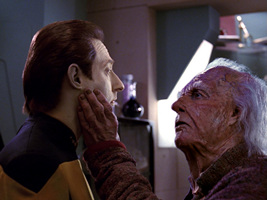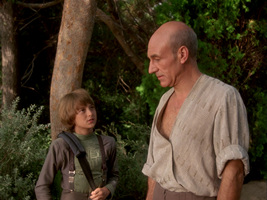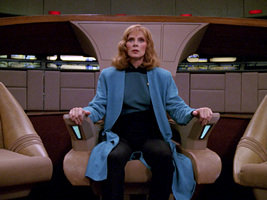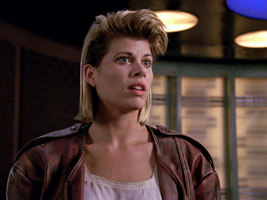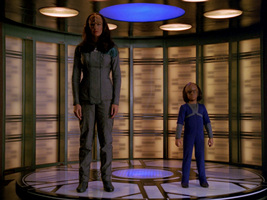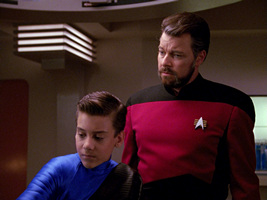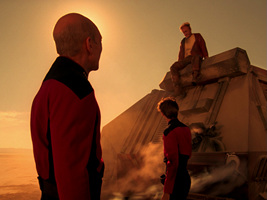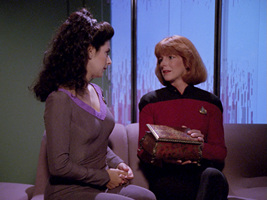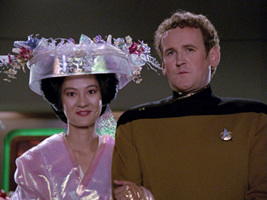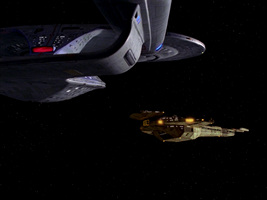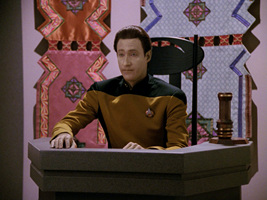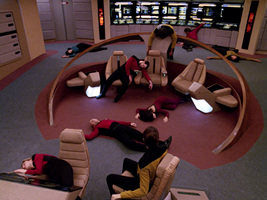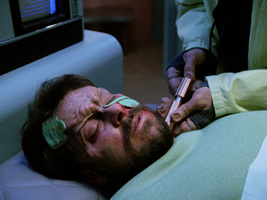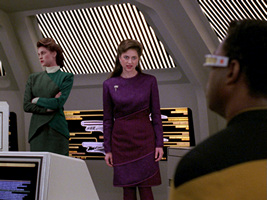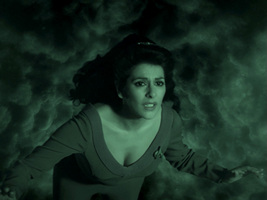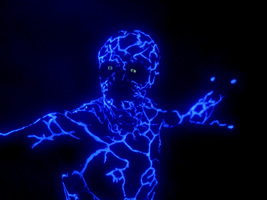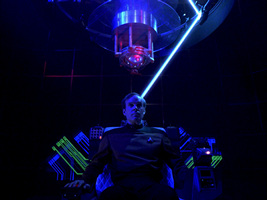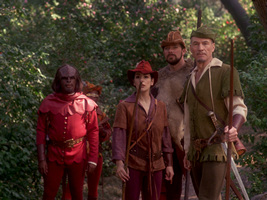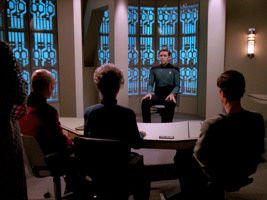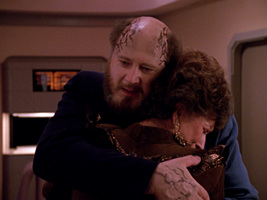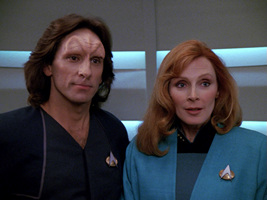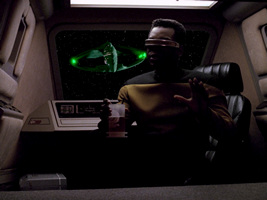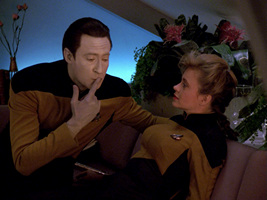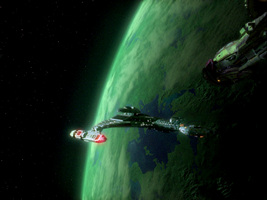The Next Generation (TNG) Season 4
Season 1Season 2Season 3Season 4Season 5Season 6Season 7
Suddenly HumanBrothersFamilyRemember
MeLegacyReunion
Future
ImperfectFinal MissionThe LossData's DayThe
WoundedDevil's Due
CluesFirst ContactGalaxy's
ChildNight TerrorsIdentity
CrisisThe Nth Degree
QpidThe
DrumheadHalf a LifeThe
HostThe Mind's EyeIn
TheoryRedemption I/II
The Best of Both Worlds II
See TNG season 3
Suddenly Human
Synopsis
Stardate 44143.7: Following a distress call from a Talarian observation craft, the away team is surprised to find a human boy on the alien ship. He is called Jono, but his actual name is Jeremiah Rossa. The Talarian Captain Endar once adopted the child as it is the custom in Talarian culture, after his soldiers had killed the boy's parents. Both Endar and Jeremiah's grandmother, Admiral Rossa, demand that the boy be returned to them. Jono, who is only accustomed to the patriarchic and violent Talarian society, does not fit into life on the Enterprise. The only authority Jono accepts is Picard, but as the decision becomes more and more pressing, Jono even attempts to kill Picard. This is why Picard finally decides to hand him out to Endar.
Commentary
I am quite familiar with this episode, and I always watch it with mixed feelings. On the bright side it is both convincing and touching in the depiction of Jono. He is a human youth, who was kidnapped by the Talarians in his early childhood, who remembers next to nothing of his former life and who quite understandably has a lot of trouble being among humans again. The changes of mood that Jono goes through are quite plausible - well, perhaps with the exception of his stabbing of Captain Picard, but I will comment on that further down. Anyway, Picard's role in the story, as Jono's new-found father figure and the only one aboard the boy would listen to, is just as well conceived and well played by Patrick Stewart. It isn't contrived that he of all people is the right one to tend to the boy, although he never had children of his own and feels uncomfortable in their presence. And perhaps most notably the debate about what would be the best for the boy is brilliant because it takes into account every possible aspect with the right weight as I think. In descending order: Jono's well-being from a medical and psychological viewpoint, his legal status as an underage Federation citizen, his grandmother's rights, Endar's claims, and the diplomatic relations with the Talarians.
It could be great if only in the end Picard, who previously called Endar's claim "clearly unacceptable", didn't spontaneously change his mind and throw overboard all the above considerations. This was obviously supposed to be a plot twist that would give the episode an interesting new direction. But the way it happens is very inconsiderate and Picard oversimplifies the issue a great deal. Without consulting anyone of his crew he lets Jono return to the Talarians. Even worse, he calls his and his crew's attempts to make Jono feel at home on the Enterprise a "crime" - in the presence of the man who once abducted him! With his miserable mea culpa attitude Picard not only vilifies his own taking care of the boy, he also causes a diplomatic disaster by strengthening the Talarian position. He gives Endar a moral victory that he simply doesn't deserve, while he effectively betrays his own superior, Admiral Rossa. Even if it is really the best for the boy to return to the Talarians (I doubt it), Picard could have achieved the same with much less damage.
Well, the captain cites an important reason for his decision, one that seemed to be missing in the discussion so far: Jono just wants to go home to Endar, to the only father he ever had. Superficially Jono does not like the prospect of being among humans again after a long time (and having fun there), as opposed to his accustomed life as a Talarian warrior. But Jono was aboard the Enterprise for maybe two days, hardly enough for him to really get to learn a possible new way of life and make up his mind. And the fact that someone is afraid of changes does not mean that everything has to stay just as it is. Picard should have recognized that. Then there is the serious issue of Jono stabbing Picard with the Klingon knife. Superficially Jono's intention according to his own words is to be executed for the crime of attacking his superior officer. But in my view he doesn't seek death any more or less than a human teenage boy or girl who slit their wrists. I think it is rather a sign of human adolescent rebellion than a Talarian thing. Jono's action shows that he needs to overcome his problems, that he needs professional help, and not the return to a place where his trauma is being suppressed. I'm not saying that Jono was tortured or brainwashed by the Talarians. He was probably happy there, but he may become at least as happy among his own kind. Unfortunately he is denied this great chance in the end.
More about the bad ethics (in my view) in this episode.
Annotations
- Continuity:
- The Talarian emblem on the observation craft is the same as on the Talarian ship Batris in "Heart of Glory".
- The name "Woden sector" is a homage to the automated freighter Woden that was destroyed in TOS: "The Ultimate Computer".
- It is the first time that we see someone play racquetball, a game that will be customary especially on DS9.
- Remarkable quote: "It's just that ever since I was a child I've always known exactly what I wanted to do. Be a member of Starfleet. Nothing else mattered to me. Virtually my entire youth was spent in the pursuit of that goal. In fact, I probably skipped my childhood altogether." (Picard)
- Remarkable scene: When Jono says goodbye to Picard in the transporter room, he steps down from the platform and eventually takes off his glove that he had kept on all the time in order to avoid contact with "aliens". I cherish this conciliatory gesture very much and I think it is absolutely necessary because it prevents the outcome from being a total triumph of the Talarians.
- Remarkable prop: We can see the famous nonsensical blinking tubes on the Talarian observation craft.
- Remarkable ships: Two miniatures start their long career in this episode: the Talarian observation craft and the Talarian warship.
- Remarkable facts: Jono's original name is Jeremiah Rossa. He is the grandson of Admiral Connaught Rossa, and the son of Connor and Moira Rossa. He was born 14 years ago in the colony of Galen IV. At the age of 3 years and 9 months his parents were killed in the Talarian attack. There were no survivors in Federation records. Endar found the boy underneath the body of a dead women, presumably his mother. He adopted him according to Talarian tradition, replacing his own son who died in the war with the Federation.
- Side note: Episodes are ordered by production numbers at EAS. "Suddenly Human" is the first produced episode after "The Best of Both Worlds II".
Rating: 5
Brothers
Synopsis
Stardate 44085.7: While the Enterprise is hurrying to a starbase to save a young boy's life who was poisoned because of a practical joke by his brother, Data suddenly seizes control of the ship and heads for an unknown planet. Data has unknowingly been called home by his creator, Dr. Noonien Soong. On the planet, Data unexpectedly meets Soong and, also to his surprise, his brother Lore who was left adrift in space almost two years ago. Soong reveals that Lore is actually the first prototype and was deactivated because he turned out unstable. It was Soong's intention to supply Data with an emotion chip, but Lore gets the chip and hurts Soong who dies briefly after. While Lore escapes, the Enterprise continues to the next starbase to save the boy.
Commentary
Only the first 15 minutes of this episode are really interesting to watch. The part of Data seizing control of the Enterprise and planning his escape from the ship is well written and is directed in a way to be thrilling from the first to the last moment. However, this prelude is rather anticlimactic in hindsight. The steam is gone as soon as Data meets his creator Noonien Soong. In the following we learn a bit about how and why Data and Lore were created and that Data isn't any less advanced than Lore (at least that's what Soong tells Data). But other than that, the episode continues in a similar fashion as "Datalore", with a rather lame "evil twin" story in which Lore poses as Data. Moreover, the question how Lore managed to overwhelm Data remains unanswered. It is not shown or hinted at in any way, obviously because it was deemed useful to save the little surprise of Soong implanting the emotion chip into Lore instead of Data for a later time. Soong's encounter with Data could have been more touching or it could have been more exciting, but the way it was written and directed it leaves me rather disappointed.
Speaking of disappointments, the B-plot about the sick boy in the isolation ward on the Enterprise and his brother is so utterly gratuitous that it becomes almost unendurable. Its principal purpose is to increase the pressure on the crew to retake control of the ship like in so many other TOS and TNG episodes where the Enterprise is unexpectedly diverted while delivering urgently needed medicine. On the top of that, the story of the two brothers on the Enterprise is much too obviously designed to be an allegory for Data and Lore, and even a direct reference to the title of the episode.
If I were to rate the acts and plot threads separately, I would go as high as eight points for the first few acts in which Data gains control of the ship, no more than two points for the part with Soong, Data, Lore and the emotion chip, and zero points for everything pertaining to the two other brothers.
Annotations
- Continuity: Lore will reappear in the double feature "Descent".
- Nitpicking: When Jake and Willie's parents went on sabbatical, wasn't there any more suited place to leave their children than the Enterprise?
- Remarkable facts:
- When Data shuts down life support on the bridge, a blue alert is issued.
- After "Datalore" Lore spent two years floating in space until a Pakled ship picked him up.
Rating: 4
Family
Synopsis
Stardate 44012.3: While the Enterprise is undergoing repairs at McKinley station, Picard visits his brother's family in La Barre, France. Robert Picard is not fond of modern technology and he fears that the captain might have a bad influence on his son René who is as enthusiastic about Starfleet as Jean-Luc once was himself. Picard, on the other hand, is tempted to leave Starfleet and join the Atlantis Project, to create a new continent in the Atlantic Ocean. After a fight in the vineyard, Jean-Luc and Robert manage to settle their dispute. In the meantime, Sergey and Helena Rozhenko, Worf's adoptive parents, visit the Enterprise - initially not to Worf's pleasure. Wesley views a holographic message his father recorded for him before he died.
Commentary
The producers obviously felt that the Enterprise and her crew couldn't carry on regardless after all that had happened with them and especially with their captain in "The Best of Both Worlds". So they came up with a slow and calm episode that technically isn't a sequel yet wraps up Picard's time as Locutus. "Family" is overall charming but also a bit boring.
It resonates with me how the contrast between Jean-Luc Picard and his brother Robert is worked out. Jean-Luc Picard customarily seeks and masters all kinds of challenges, and yet he remains a decent and apparently modest man. Robert, on the other hand, is a family man who has no interest in anything extraordinary or anything outside his village or vineyard, and yet he resents Jean-Luc for always winning the laurels and still remaining composed. Moreover, Robert is worried that his son René, who is interested in starships and who is fond of his "uncle from space", may become just like Jean-Luc. Actually, I think in his mindset Robert could "afford" one rogue son to become just like Jean-Luc, if only there were another child to take care of the vineyard. But Robert and his wife are not the youngest any more. Robert doesn't explicitly mention it, but most of all he may be afraid that no one could be left to continue the family tradition. This is overall worked out nicely.
I only have a problem with the outcome. So it turns out that Picard's peace of mind is only superficial. He is still suffering from his experience of being a Borg, of having his mind controlled by an alien force and of being unable to resist them. Of course, there is nice continuity with "The Best of Both Worlds" and with Deanna's suspicion from the beginning of the episode that Picard may still have a long way to go. But his confession that he still suffers has little to do with his brother and it remains an isolated statement after their mud wrestling match. Sure, Robert provokes an emotional reaction from his brother but this doesn't change anything about his resentments. As Robert says himself, "I still don't like you, Jean-Luc." I think this is more than just an ironic remark. Robert's eventual realization that his brother's way of life is fine and that René should find his own way too is not really plausible.
Two sub-plots deal with Worf's parents and with a holographic recording from Wesley's father, respectively. A bit like Picard, Worf and Wesley too have to cope with traumas, and they too meet members of their families after a long time. I think the sub-plots work nicely, but like in "Brothers" they were too much designed to suit the title and motto of the episode.
Annotations
- Continuity:
- The episode refers to the events of "The Best of Both Worlds" several times.
- Picard tells Louis, who is working on the Atlantis Project, that they used harmonic resonators to relieve the tectonic pressures on Drema IV ("Pen Pals").
- Guinan tells the Rozhenkos of Worf's fondness of prune juice.
- In "Star Trek Generations" Picard will learn that Robert and René have died in a fire.
- Nitpicking:
- The two Russian visitors both have a (faux) Russian accent, while the French don't have an according French accent.
- At the dinner in La Barre everyone of the Picard family pronounces "salut" differently, some rather English, some more French.
- How does Sergey Rozhenko get the idea that Miles O'Brien is a chief petty officer? O'Brien is wearing the rank pips of a lieutenant.
- Remarkable running gag: Sergey Rozhenko has all the specs and schematics of the Enterprise at home, as he keeps telling everyone on board.
- Remarkable prop: We can see an odd chair in Worf's quarters that previously appeared on the Tarellian bridge in "Haven". It was designed by Peter Opsvik.
- Remarkable 47: Robert gives Jean-Luc Picard a bottle of Château Picard 2247 vintage.
- Remarkable absence: We don't see Data in this episode.
- Remarkable facts:
- Picard's home village in France is named La Barre.
- Sergey and Helena Rozhenko arrive from Earth Station Bobruisk. Sergey served as a chief petty officer on the USS Intrepid.
- Side note: Episodes are ordered by production numbers at EAS. "Family" was filmed after "Suddenly Human" and "Brothers".
Rating: 4
Remember Me
Synopsis
Stardate 44161.2: Dr. Dalen Quaice, Beverly's old mentor, comes aboard the Enterprise. Contemplating Dr. Quaice's recent loss of his wife and the death of her husband Jack, Beverly enters main engineering, just as Wesley is performing a warp field experiment. The next day Quaice is gone, and no one except for Beverly remembers him. Moreover, Enterprise crew members keep disappearing until only Beverly is left, all alone on the big ship. Beverly learns from the ship's computer that the entire universe has a diameter of 705m. She is actually trapped inside a static warp bubble that Wesley created. On the other side, Wesley and the Traveler, who has come to help, generate a vortex through which Beverly is supposed to escape, and finally she realizes that she must not avoid but use this exit.
Commentary
This is the most fascinating and one of the most thrilling episode of TNG so far. The story does have its scientific and logical flaws, but it overall works well in conjunction with the concept of a "reality based on thoughts" already established in "Where No One Has Gone Before". The appearance of the Traveler from that episode provides additional continuity in this regard. I am very glad that Beverly's experience of the warp bubble reality doesn't have to be rated as an isolated "weird phenomenon of the week".
The idea that at the time of Wesley's experiment Beverly is lost in thoughts about people who have died (Dr. Quaice's wife and her own husband Jack) and hence creates a universe in which people keep disappearing is a bit contrived. Yet, I like how the physical and the psychic aspects are woven together in the story. Beverly is not just caught in any spatial phenomenon but in one that she created with her own mind and based on her own emotions. And as she investigates the phenomenon she also explores her own psyche. I think Gates McFadden does a great job in this episode. It is actually the first one in which Beverly Crusher alone is in the center of interest.
It is extraordinarily exciting to watch how Beverly Crusher frequently has to reassess her situation. It all starts with the flash in engineering due to Wesley's warp bubble experiment that doesn't seem to bother her very much. But some time later Beverly discovers that her friend Dr. Dalen Quaice in not in his quarters and she can't locate him anywhere else on the ship. It seems that Dr. Quaice has fallen and may be lying on the floor somewhere on the ship, with his communicator malfunctioning. At least that is the most logical explanation at the time. After she has enlisted Worf's help it becomes clear that Quaice is not aboard at all. But even worse, there are no records of Quaice ever coming aboard the ship in the first place. The man doesn't even exist according to Starfleet records. A conspiracy? And if it is so, why would even Picard, who authorized Quaice's stay on the ship, or O'Brien, who beamed him aboard, lie to Beverly? At this point of the episode it is more plausible that Beverly is hallucinating, rather than everyone else would lie to her. But then more and more crew members keep disappearing. The crew count goes down from over 1000 to 230 and then to 114. Eventually even the bridge crew is gone. It is just too obvious that such a huge ship can't operate with a crew consisting of just Picard and Beverly, or even of Beverly alone. Reality has been altered in some fashion that Beverly tries to find out.
Annotations
- Continuity: At one point in the episode Beverly calls Dr. Selar (from "The Schizoid Man"), who too turns out to have disappeared in her reality. Dr. Selar will be mentioned in some more episodes but never appear in person again.
- Nitpicking:
- If Beverly's thoughts created the universe inside the warp bubble, how does this reality's Wesley get the idea that his warp bubble experiment caused the whole trouble? Well, perhaps it comes from Beverly's subconscious mind, which gave her version of Wesley the idea of what went wrong before she herself becomes aware of it.
- The reality inside the warp bubble is shown from Beverly's perspective, but not quite consistently. It shows some people that Beverly couldn't possibly see, such as Wesley as he calls from engineering.
- Remarkable quote: "The universe is a spheroid region 705 meters in diameter." (Enterprise computer)
- Remarkable starbase: Starbase 133 is of the same (huge) type as Starbase 74 from "11001001", using the same effect shots (originally from "Star Trek III").
- Remarkable appearance: Eric Menyuk reprises his role as the Traveler from "Where No One Has Gone Before".
Rating: 8
Legacy
Synopsis
Stardate 44215.2: The Federation freighter Arcos explodes in orbit of Turkana IV, a failed colony that is now devastated and divided and whose population lives in the underground. Turkana IV was Tasha's home planet. The two crew members survive in an escape pod but are taken hostages by the Alliance, while their enemies, the Coalition, offer their help to the Enterprise to find them. They send Ishara Yar, Tasha's sister, to the Enterprise. Ishara leaves a very good impression, but her actual goal is to have her personal proximity detector disabled that both Turkana factions agreed to years ago in order not to be able to destroy each other. Dr. Crusher removes the detector, thereby inadvertently enabling her to overload the Alliance's power plant on the following away mission. After freeing the hostages Ishara manipulates the reactor as planned, but Data stops her. Disappointed about the betrayal, the Enterprise crew leaves Ishara behind on Turkana IV.
Commentary
At first it seems that "Legacy" is based on the same boring clichés as many episodes especially of the first two seasons. There is a freighter crew that needs to be rescued, and a planet that has been at war for a long time. Fortunately Ishara Yar's appearance (This is the "Season of the Family"!) totally shifts the focus away from the uninteresting initial setting. "Legacy" is already the third episode after "The Measure of a Man" and "Yesterday's Enterprise" that wraps up Tasha Yar's death in some fashion. This is noteworthy, considering how small Tasha Yar's role was in the first season. I especially find Ishara's and Data's interaction remarkable. It once again emphasizes how much Tasha meant to Data, and it further elaborates on how he experiences a friendship, by getting used to someone and accordingly missing someone who is gone.
It is an essential part of the story that the crew want to see the late Tasha in Ishara. Their curiosity is great, their expectations are high, and their reactions to Ishara are noticeably emotional. While it is only human, I think the crew's excitement about Tasha's sister is overdone though, up to the point where it becomes naive. Not because I contest that Tasha means a lot to them but because I think common sense ought to play more of a role. At some point someone should have recalled that Ishara is a different person with a different path of life and that even without the possibility that she might consciously deceive the crew she would never become like Tasha. Yet, after two trials (the first away mission on the planet and the DNA test) Ishara has the almost unconditional trust of the crew. She switches from her rogue clothes to the sociable catsuit. She has little trouble convincing everyone that she has a desire to leave the planet and even join Starfleet in the footsteps of her sister. Ironically it is Ishara herself who still repeatedly points out the dissimilarities between Tasha and herself, while most of the Enterprise crew, and especially Data, like to focus on what they have in common. Ishara even gives Data a cue after he has told her that they are going to remove the implant and expect nothing in return: "On the colony, nobody does anything for anyone else unless they have something to gain from it." It is Troi who senses at some point that Ishara's loyalties are divided, but even she fails to find out the whole truth about the guest.
So everything about Ishara is a big deception. And although the viewer is given one or two more cues about Ishara's true intentions, we tend to trust in Picard's and Data's judgments and we believe she might stay with her new and clearly better "family" in the end. I admit they got me when I first watched it. The second time it was blindingly obvious to me that the crew just wanted to be fooled and that Ishara, under the given circumstances, would perhaps reconsider her mission for a moment but would never seriously go as far as developing a desire to join Starfleet (just because that's where her sister's friends are). "Legacy" is one of several episodes that play with our expectations, and it is among the successful ones in this regard.
That said, despite the fact that the crew made it very easy for Ishara, I think she plays her role just too well, considering that she had virtually no time to prepare herself.
Annotations
- Nitpicking: How can each of the two factions control that every member of the other faction has a proximity detector, especially the new ones?
- Remarkable dialogues:
- "You took some unnecessary personal risks, Number One." - "We lost Tasha on an away team under my command. The thought of the same thing happening to her sister..." (Picard and Riker)
- "Are you able to have friends?" - "Yes." - "But you don't have feelings, do you?" - "Not as such. However, even among humans, friendship is sometimes less an emotional response and more a sense of familiarity." - "So you can become used to someone?" - "Exactly. As I experience certain sensory input patterns, my mental pathways become accustomed to them. The inputs eventually are anticipated, and even missed when absent." - "Like my sister." - "Yes, like your sister." (Ishara and Data)
- Remarkable absence: Wesley Crusher does not appear in this episode.
- Remarkable facts:
- The government of Turkana IV feel apart many years ago. There are no reliable communications since that time. Two factions formed that keep struggling for power: the Coalition and the Alliance. The last Federation vessel to make contact was the Potemkin, six years ago. They were warned that anyone transporting down to the colony would be killed.
- Tasha and Ishara's parents were killed in some crossfire just after Ishara born. Some people took care of them for a few months, then one day they were gone. So Tasha took care of Ishara. When she was old enough, Ishara joined the Coalition, whereas Tasha hated the cadres.
Rating: 5
Reunion
Synopsis
Stardate 44246.3: Ambassador K'Ehleyr beams aboard with disturbing news: Klingon Chancellor K'mpec is about to die of continuous poisoning. To Worf's surprise she is accompanied by Alexander, their common son. K'mpec wants Picard to act as the Arbiter of Succession and nominate the new leader, since he suspects that one of the two contenders poisoned him, and there is no one in the High Council he can trust. K'mpec dies briefly after. One contender is Duras, whose father once betrayed his people for which the blame was put on Worf's father Mogh; the other one is Gowron, who has few supporters in the High Council. The sonchi ceremony, in which the two confirm K'mpec's death, is disrupted by the explosion of a bomb. In order to gain time, Picard switches to an old and complicated form of the Rite of Succession, the ja'chuq. When K'Ehleyr finds evidence about what really happened on Khitomer, Duras kills her. Worf, in turn, kills Duras. In the meantime evidence has been found that it was indeed one of Duras's men who carried the bomb that was of Romulan origin. Gowron is named chancellor, and Worf decides to let the Rozhenkos raise his son Alexander.
Commentary
It becomes clear after just a few minutes that this is going to be a big episode, one that weaves together the two story threads from "The Emissary" and "Sins of the Father". And this is done in a nearly seamless fashion, as if the two previous episodes (from the second and the third season, respectively) had been produced just a few weeks ago. There is great continuity with everything established about the Klingons, about K'Ehleyr and especially about Worf's discommendation so far. It is a very thrilling and very revealing episode.
Maybe it was not wise to kill off K'Ehleyr, which was done although it should have been obvious that she was an interesting character as Worf's mate and as a link between the Federation and the Klingon Empire. Like many other fans I was first disappointed that the writers "allowed" Duras to kill her so easily. Maybe it was a mistake, and the series could have carried on with her being alive and a regular guest. On the other hand, she is conceded a quite active role in this episode before and even after her death, which somehow gives it a meaning and avoids the impression that it is gratuitous. K'Ehleyr acts as K'mpec's emissary, as Picard's advisor, as a mother who wants Worf to accept his son, as a lover who is concerned about Worf's discommendation, and as an investigator who finds out the truth about Duras's betrayal. The latter gets her killed, and it sets the stage for Worf's vengeance on Duras.
Worf's action is understandable by human ethical standards. It thereby reduces our distance to the character, for an additional emotional impact. And it further corroborates Worf's famous standing as a lone avenger whose enemies frequently try to defeat him by taking away everything from him. Worf's development in this episode aside from the act of vengeance is just as interesting. He is initially too embarrassed about his discommendation to only be present when Klingons come aboard the ship, upon which Picard has to remind him of his duty. Well, in the case of K'Ehleyr the Klingon tradition certainly doesn't play such a great role as Worf thinks, but he is in an additional dilemma that he can't tell her what really happened on Qo'noS. Anyway, after the explosion Picard brings Worf into play quite skillfully, thereby giving his officer new self-confidence as he is to present the evidence to the Klingons. It also puts the two suspects Gowron and Duras in their places, who would normally not want to be in the same room with the outcast but now have to listen to him in the function as the ship's security officer.
Regarding the criminal case of the murder of K'mpec and the bombing, I am glad that the previous evidence of Duras being a traitor (or someone who covered up his father's crime by blaming Worf) is not used as a red herring here. Duras, the one that is naturally Worf's prime suspect, turns out to be guilty in the end, and Worf's instinct turns out to be right.
Annotations
- Nitpicking:
- Does someone who has been dishonored still have the right of vengeance? Would Duras's people, of whom one had agreed to the suicide bombing, really let him go?
- Klingon children grow amazingly fast. Alexander is around seven months old by the time of this episode!
- Remarkable prop: "Reunion" marks the first appearance of the bat'leth, which was designed by Dan Curry. Worf uses it in his fight with Duras, who has a different type of sword. This is a small continuity problem, considering that after this episode the bat'leth will be the one traditional Klingon weapon that can be seen just everywhere, with ironically only Worf switching to a mek'leth. This raises the questions where the bat'leth was in earlier TNG episode and in TOS.
- Remarkable ship: This is also the first appearance of the Vor'cha attack cruiser, designer by Rick Sternbach.
- Remarkable appearances: We can see the regular characters of Gowron (Robert O'Reilly) and of Alexander (here played by Jon Steuer) for the first time.
- Remarkable fact: The Enterprise crew currently includes representatives from 13 planets.
Rating: 8
Future Imperfect
Synopsis
Stardate 44286.5: Riker becomes unconscious in a cave on Alpha Onias III, and he wakes up on the Enterprise sixteen years later. According to Beverly a virus has wiped out his whole memory of the years in between. Riker tries to fit into his new role as the ship's captain and father of young Jean-Luc. Yet, he remains suspicious because of the frequent malfunctions of the ship's computer and he doesn't trust Romulan Ambassador Tomalak with whom he is supposed to negotiate a treaty. When Riker discovers that he was allegedly married to Minuet, he knows this all must be a ruse, because Minuet was only a hologram. Riker ends the simulation and finds himself in a Romulan holodeck where he was to reveal the location of Outpost 23 to Commander Tomalak. He meets Jean-Luc again, who now calls himself Ethan, and together they try to escape from their Romulan prison. Ethan, however, accidentally mentions that Tomalak was an ambassador in the Romulan simulation which he should not know. Riker urges him to end this simulation too, and the two are back in the cave again. The boy is actually an alien who was left behind by his parents. A hologenerator being his only company, he was just seeking a friend.
Commentary
The story of "Future Imperfect" plays with our expectation that the future that Riker experiences as captain of the Enterprise just has to be true because it is such a plausible extrapolation of the events of Star Trek so far. A virus that erases all memories of the past 16 years, Klingons and Ferengi aboard the ship, peace negotiations with the Romulans, Geordi with implanted eyes, Picard as an admiral, Riker's son Jean-Luc - a lot has changed since Riker was allegedly infected on Alpha Onias III, but we know that stranger things have happened. Riker should readily accept such changes, just as the Trek savvy audience. Yet, while we tend to believe that Riker really is in the future, he himself is suspicious when he has to negotiate with Ambassador Tomalak, the person who wanted to dismantle the Enterprise as a war trophy and to whom he has to reveal the location of Outpost 23 that is of strategic importance (or rather was, 16 years ago). There are additional cues that something is wrong in spite of everything, in the form of the computer delays. Then the video depicting the Minuet from "11001001" appears, providing Riker with solid evidence that he is being tricked. A future in which a holographic character becomes alive just can't be true. He tests the scenario asking Worf where he got his scar, and requesting speed calculations from Data that the android fails to provide, with the lame excuse that subspace interferences impair his abilities.
This is the first turning point. Riker finds himself in a Romulan holodeck where he was indeed supposed to reveal the location of Outpost 23 to Commander Tomalak. And the computer delay appears as totally plausible, considering that the scanners that probed his mind were too slow in cases when he did something unexpected. But Riker remains suspicious, unlike the viewers to whom this new scenario is realistic yet again. Riker thinks the Romulan scenario still isn't authentic, and the boy who is arrested together with him gives him the decisive hint when he erroneously mentions "Ambassador Tomalak". The outcome may seem disappointing at first, as neither Riker's vision of the future nor the Romulan espionage story are true, and after all it is only about a boy who didn't want to stay alone. But it is a very fitting ending to an episode that could easily do without fierce conflicts or even violence and was still very exciting. Also, that way the Romulan connection doesn't appear gratuitous, because the very idea of the Romulans probing Riker's mind really comes from Riker's mind.
I really dig this whole story, although Riker is rather uninteresting as a character because he is just too smart here and his instincts are impeccable. Riker in an identity crisis, a bit like it would be done eventually in "Frame of Mind", wouldn't have been bad for the story, but I understand there was simply no time for something like that (and perhaps, that it was intentionally kept light-hearted) .
Anyway, "Future Imperfect" was very innovative at the time it was made. The episode should receive the due credit as the first and one of the best of its kind, although the plot in which a crew member is confronted with a false reality has become so common that it is almost a cliché by now. What happens here served as an inspiration for for TNG: "Ship in a Bottle" (simulation within a simulation), DS9: "Shadowplay" (simulation compensates for loneliness), TNG: "The Inner Light" (illusory reality) and "All Good Things" (flashforward), to name only a few obvious examples.
Annotations
- Nitpicking:
- Considering that it was foreseeable that the atmosphere was toxic or at least unhealthy, why didn't the away team beam down with spacesuits? Of course, the real-life explanation is that no according costumes were available at the time of the episode.
- What do people in the 24th century customarily say when they find themselves in an absurd situation? "Computer, end program!" Riker doesn't try anything like that.
- In the illusion created for Riker, Data is seen talking to Tomalak on the bridge after Riker has already entered the ready room. Riker may still have heard part of it but he couldn't see them.
- Remarkable sets and props: In the false reality there are changes to sickbay with new monitors around the biobed. The doors now have additional markings in dark red. The peripheral bridge stations and the central portion of the arc of the tactical station were redesigned. The uniforms now lack the rank pips. The rank signs were incorporated into the design of the communicator.
- Remarkable appearances:
- This is the third appearance of Andreas Katsulas as Tomalak after "The Enemy" and "The Defector".
- We can also see Carolyn McCormick as Minuet again after "11001001".
- Remarkable (false) fact: On Alpha Onias III, Riker was infected "with a strain of Altarian encephalitis, a retrovirus that incorporates its DNA directly into the cells of its host. It can lie dormant for many years and then suddenly become active again."
Rating: 8
Final Mission
Synopsis
Stardate 44307.3: Briefly before Wesley is leaving for Starfleet Academy, he accompanies Picard and a miner named Dirgo to negotiations on Pentarus III. Their shuttle, however, crashes on the desert moon Lambda Paz. A remote mountain range is the only protection against the burning sun. They find a water fountain that is protected by a forcefield. Dirgo tries to destroy the forcefield with his phaser, which releases a rock avalanche that severely hurts Picard. When Dirgo, against Wesley's advice, fires at the forcefield again, he gets killed. Wesley promises the ailing Picard that he will not give up. He analyzes the forcefield and finally finds a way to disable it and get the water for the captain. In the meantime, the Enterprise has saved the population of Gamelan V from an old freighter with a radiation leak in their orbit by towing the vessel into the Gamelan sun.
Commentary
"Final Mission" tells a rather conventional story about a shuttle crash and the passengers' struggle for survival on a hostile planet. It includes a plot device in the form of the mysterious forcefield around the fountain, perhaps just to make it more sci-fi like. Well, the forcefield is not totally gratuitous. Although it was most likely just designed by some alien civilization to protect the water, it also serves as a test of character here. Dirgo utterly fails the test. He repeatedly fires at it without deliberation and gets killed. Wesley, on the other hand, who has the additional motivation to save the injured Captain Picard, examines and eventually tricks the mechanism. Well, Dirgo is jerk anyway, one of those stock characters that appear on TNG to let our heroes (Wesley in this case) appear in an even brighter light. I don't care for him at any time in this episode.
The most interesting part about the episode is Picard and Wesley's interaction. In many ways "Final Mission" expands on the story of their previous shuttle ride in "Samaritan Snare", when Picard trusted Wesley with personal information that he would normally not reveal to any of his crew. Now the two are very close to having a father-son relationship, which shows several times in the episode and which wouldn't even have needed Picard's severe injury to bring the two even closer together. Besides building an emotional attachment between Picard and Wesley, the main purpose of "Final Mission" in the context of the series is to act as a worthy goodbye episode for Wesley Crusher (and Wil Wheaton). I think this goal has been accomplished, because here Wesley appears as a young man who has learned a lot since the first season when his curiosity and his adolescent carelessness used to embarrass the captain and endanger the ship.
The B-plot about the radioactive freighter essentially just serves to divert the Enterprise, and although the technical details are worked out nicely I don't care for it because it remains all technical.
Annotations
- Nitpicking:
- After entering the cave, no one comments on the obviously man-made steps on the inside that Picard, Wesley and Dirgo find by a huge coincidence (well, actually by following Wesley's EM readings).
- The asteroid belt between Gamelan V and its sun is the apparent reason why the Enterprise has to tow the freighter a long way after the attempt to use the engine pods has failed. However, wouldn't it have been much easier to tow away the freighter from Gamelan V perpendicular to the ecliptic for a short time and let the inertia do the rest? The Enterprise could have rushed to save Picard and Wesley and could have returned any time to finish the work, by reversing the course of the freighter into the Gamelan sun, now completely avoiding the dangerous asteroid belt (assuming that the asteroid belt is what it says, a belt and not a sphere)?
- Why should the radiation levels steadily rise while the Enterprise maintains a constant distance towing the freighter? The writer may have mistaken the repeatedly mentioned dose per time (in millirads per minute) for a dose (in millirads).
- Remarkable quote: "Sir, you don't know this. No one knows this, because I never told anyone. All of the things I've worked for, school, my science projects, getting into the Academy, I've done it all because I want you to be proud of me. If there is one thing that I've learned from you, it's that you don't quit. And I'm not going to quit now. I've seen you think yourself out of worse problems than this, and I'm going to think us out of this. You're not going to die. I'm not going to let you die. I'll get to the water and I'll keep you alive until they find us. I promise." (Wesley)
- Remarkable location: The scenes on the moon surface were filmed in the El Mirage Dry Lake Bed in the Mojave Desert. I like this departure from the often rather claustrophobic planet sets in the studio very much.
- Remarkable ship: The sublight freighter in this episode is another re-use of the Batris, although it has to be a lot bigger.
- Remarkable appearance: Captain Dirgo is played by Nick Tate. As Alan Carter in Space: 1999 he crashed a few more spacecrafts than here.
- Remarkable fact: Picard mentions Boothby, the groundskeeper of Starfleet Academy, for the first time. He will appear in person in TNG: "The First Duty".
Rating: 5
The Loss
Synopsis
Stardate 44356.9: Just as the Enterprise gets stuck in space for a yet unknown reason, Deanna's telepathic abilities suddenly vanish. She tries to cope with it but becomes more and more desperate about her loss. Although her friends and colleagues encourage her to carry on, Deanna decides to resign as the ship's counselor. It turns out that the reason for the ship's inability to move is that it is surrounded by two-dimensional lifeforms. The creatures are heading for a cosmic string, which may not harm them but would be fatal for the Enterprise. When Data creates a "dummy" string to the ship's rear, the creatures are confused and move away long enough for the Enterprise to break free; Deanna's abilities are restored in an instant.
Commentary
After "The Survivors" and a couple of episodes that inflicted only minor headaches upon Counselor Troi, I think it is "The Loss" that firmly establishes the cliché that she has to suffer a great deal whenever it is deemed useful to give an alien lifeform or a spatial phenomenon an additional sentimental touch. It is not the last time something like that happens with her. The legacy of the emotionally tormented Troi will continue, notably in TNG: "Night Terrors", TNG: "Man of the People" and "Star Trek: Nemesis". Actually, the mere impression of Troi suffering from the loss of her telepathic abilities is the thing I used to remember well about "The Loss" - rather than the commentary on disabled people, how their environment treats them and how they really want to be treated.
Maybe the reason why I never cared much for the deeper significance of the story is that it lacks credibility. I'm not a psychologist, but the plot may be commended for depicting the five phases of Troi's loss more or less in the correct order: denial, anger, bargaining, depression and acceptance. Yet, I strongly doubt that all of this would happen in a just few days, and it doesn't become more plausible just because Ensign Brooks, Troi's patient, likewise has completely different feelings about her husband's death every day (although it happened as long as five months ago!). Even if it should be still realistic from a psychological viewpoint, this sub-plot is a nuisance anyway, because it goes like this: "I'm so happy all the time... Uhm, no, I still have trouble... Oh, I'm perfectly fine now no matter what you say... No you were right, thank you so much." Well, speaking of the phase of anger, at least it gives us a character conflict when Troi storms into sickbay and complains to Beverly for not treating her sooner. On the other hand, this is a silly overreaction, just as her premature resignation as the ship's counselor. I think Marina Sirtis plays her part well, and it is primarily her merit that Deanna remains in character in spite of everything.
The plot thread about the two-dimensional entities largely fails to catch my interest because it is rife with clichés. As always in such a plot, the phenomenon has never been recorded before. As always, the ship is not just stuck somewhere but is going to be destroyed. And as always, it is saved in the nick of time. And considering that everything pertaining to the two-dimensional entities is full of technobabble anyway, I would at least have expected an explanation why they impaired Deanna's telepathic senses. The only aspect of note is that Data and Troi are working on the problem, although the efficiency of this pairing of objectiveness and emotion has become sort of a cliché itself.
Annotations
- Nitpicking:
- The forward sensors could not detect the two-dimensional entities, which would only be the case if their angle of aperture were zero.
- Nothing in the three-dimensional world has an effect on the two-dimensional entities, yet they are subjected to the gravity of the cosmic string and drag along the Enterprise.
- Data says that the entities maintain a constant course and speed, although the gravity should accelerate them.
- Remarkable dialogue: "If you were anyone else, you know the first thing I'd do? I'd send you to Counselor Troi." - "Well, then I have an advantage, don't I? I see her quite often." (Crusher and Troi)
- Remarkable red herring: After her argument with Beverly, Deanna returns to her quarters, which is filmed from below, with a glass table placed conspicuously in the foreground. Yet, unlike K'Ehleyr in "The Emissary", she doesn't smash it.
- Remarkable fact: Many races are not empathically detectable, including the Breen and the Ferengi.
Rating: 3
Data's Day
Synopsis
Stardate 44390.1: When Keiko Ishikawa tells Data she would better call off her wedding with Miles O'Brien, Data does not find the right words to tell O'Brien. Of course, O'Brien is not glad about it at all. Meanwhile the Enterprise meets with a Romulan Warbird in the Neutral Zone, where Federation Ambassador T'Pel is supposed to negotiate with the Romulans. T'Pel, however, is killed in a transporter accident. After a closer examination Data and Dr. Crusher find evidence that the accident was a ruse and T'Pel was actually abducted by the Romulans. The Enterprise follows the Romulan ship, only to learn that T'Pel is a Romulan spy whose real name is Selok and who has returned home. The wedding takes place as scheduled.
Commentary
"Data's Day" is the probably most unusual TNG episode so far. It is told almost entirely from Data's perspective and is accompanied by his voice-over, which is a first time in Star Trek (not counting in occasional brief log entries). Although it seems somewhat less "natural" to me that voice-overs replace some of the otherwise necessary dialogues, there is a certain charm to this way of storytelling. The narrator gives the episode a clearer structure and may help avoid long expositions. I don't think it should be done very often though, and despite the success of the experiment the producers obviously thought the same and used narrators only in a few future episodes, such as notably in ENT: "Dear Doctor" where Dr. Phlox compiles a report in a similar fashion as Data does here.
It is just as unusual that the plot that would normally be more important (the story about T'Pel) ranks behind the one with the personal focus (Data's diary and particularly his involvement in the O'Briens' wedding). Considering that the spy story would have made a decent A-plot, while everything else is very trivial, this switch of priorities is only possible in combination with Data as the narrator. We are watching just what the episode title says, and not a story with an "objective" representation of facts and events.
Regarding the cancellation of the wedding, the story creates the impression that Data misinterprets Keiko's understandable uneasiness in anticipation of her great day, a mistake which he could and should avoid if he were human. However, in my view not Data makes an error, but only Keiko. Albeit on Data's suggestion, she explicitly tells him to let Miles know she'd cancel the wedding. She should be aware that for Data it must sound like she means exactly what she says, and even many human negotiators may have screwed up under these circumstances. Data could only say something else to Miles than that canceling the wedding would "increase her happiness". Data's alleged mistake would have made more sense, had Keiko said to him something like "I feel uncomfortable, I'd wish I could cancel the wedding" and Data had done it for her, without her explicit consent.
Annotations
- Continuity:
- Data compiles a report for Commander Maddox (TNG: "The Measure of a Man").
- It is the first time we can see the night watch on the bridge, with dimmed light and reduced personnel. This begs the question, was everything that ever happened on the bridge so far during the day watch?
- We can see Spot, Data's cat, for the first time (or rather, his first cat of that name).
- This episode introduces Keiko O'Brien née Ishikawa, who will frequently appear until the end of DS9.
- Miles Edward O'Brien's full name is spoken out for the first time.
- A Bolian hairdresser can be seen for the first time, identified in the script as V'Sal. The better known Bolian hairdresser Mr. Mot will be played by a different actor in "Ensign Ro" and "Schisms", so it is reasonable to assume they are indeed two different people.
- The Enterprise gathers long-range information on the Murasaki quasar (TOS: "The Galileo Seven").
- Picard speaks almost the same introductory words to the wedding as Kirk in TOS: "Balance of Terror": "Since the days of the first wooden sailing ships, all captains have enjoyed the happy privilege of joining together two people in the bonds of matrimony."
- We can see the arboretum of the Enterprise-D for the first time.
- Data mentions how Captain Picard introduced him to Sherlock Holmes (TNG: "Lonely Among Us").
- Remarkable scenes:
- Data says (in the voice-over): "It is fortunate that I am able to perform my duties without emotional distractions. If that were not the case, a sudden course correction toward the Neutral Zone would make me very nervous." During this shot we see how he is tapping his fingers.
- Towards the end of the dance lesson, Beverly tells Data to smile, upon which he keeps grinning.
- Remarkable set: We can see a replicator room, featuring replicators with an open platform, unlike the normal inbuilt type in the quarters.
- Remarkable props: We can see the transporter test cylinders again, prominently for the second time after "The Ensigns of Command".
- Remarkable facts:
- It is the 1150th day since the Enterprise was commissioned.
- The Romulan Warbird is called Devoras, which happens to be Latin, meaning "you swallow". I still wonder whether this is a coincidence.
Rating: 6
The Wounded
Synopsis
Stardate 44429.6: The starship USS Phoenix under the command of Captain Benjamin Maxwell violates the peace treaty with the Cardassians and destroys one of their science stations. The Cardassian Gul Macet and two aides come aboard to urge Picard to destroy the Phoenix, if necessary. Although Picard eventually provides them with the transponder codes of the Phoenix, Maxwell destroys two Cardassian vessels. Maxwell lost his family in a Cardassian attack on Setlik III and believes that they are planning a new war. Picard relieves him of his command, but Maxwell escapes again, eager to prove his suspicion. O'Brien, who served under Maxwell, beams to the Phoenix and convinces him to surrender. Picard warns the Cardassians that he believes Maxwell and that the Federation will be watchful.
Commentary
At the first glance this looks like another episode that delves into a history that was quickly made up for one particular occasion and will never be referenced again. In fact, considering that the Federation has been at war with the Cardassians until recently and that O'Brien as well as Picard and probably some more of the crew fought against them, it is odd that we have never heard of them before, and if only in casual mentions. However, the potential of the Cardassians as latent enemies of the Federation in an uneasy truce more than makes up for the failure to introduce them sooner.
I think "The Wounded" is the perhaps most serious episode of the series so far. It tackles the real-world issue of persistent enmity after a war, but not the way it was done especially in the first and second season when the crew was in the comfortable position to lecture some aliens-of-the-week on how to keep up the peace. Now the crew is involved quite personally. Even a bit too blatantly in my view. While O'Brien's reaction to the Cardassians is still understandable in light of his memories of the Setlik massacre, even Picard is unusually hostile towards the Cardassians, and there is a disparaging inflection in his voice whenever he only speaks out "Cardassians".
On the other hand, Picard does the right thing when he basically supports the Cardassians to stop Maxwell, yet always leaves a loophole for the fellow captain. In the end Gul Macet thinks the Cardassians have won some important points over the Federation, but Picard doesn't let him leave with this diplomatic victory and reminds him that Maxwell was most likely right with his suspicions against the Cardassians, and that the Federation will be watchful. Picard only makes a mistake when he allows Maxwell to return to his ship earlier in the episode, upon which Maxwell once again escapes. We have to wonder anyway why his crew apparently follows all of his illegal orders, but we will never know because we never see any of them.
On a final note about the Cardassians, while I like how they insist on their position in the beginning, they remain too calm as the tensions are rising. They should protest more vehemently when Maxwell destroys the warship and the supply ship and once again when he demands to board another supply ship.
Annotations
- Nitpicking: Picard states in his log entry that a peace treaty with the Cardassians was signed just one year ago. Later on the bridge, Troi says "They're our allies now, Mister Worf. We have to trust them." There is a big difference between a peace treaty and an alliance. Since nothing in the episode supports the latter, Troi is mistaken (and Worf should have corrected her).
- Remarkable quotes:
- "I think when one has been angry for a very long time, one gets used to it. And it becomes comfortable, like old leather. And, finally, it becomes so familiar that one can't ever remember feeling any other way." (Picard)
- "It's not you I hate, Cardassian. I hate what I became because of you." (O'Brien)
- Remarkable song: O'Brien remembers "The Minstrel Boy" from his service in the Cardassian War, and later intones it on the Phoenix, thereby appeasing Maxwell.
- Remarkable scene: Troi leaves the transporter room with the Cardassians, then turns round for a moment and gives O'Brien a glance, obviously because she senses his deep-seated anger.
- Remarkable aliens: The episode marks the debut of the Cardassians. For the first and the last time they are wearing a "wire helmet" that doesn't serve any apparent purpose. Also, Gul Macet will remain the only Cardassian with a moustache.
- Remarkable set: A special set (with unfitting straight walls) was constructed for Maxwell's ready room on the Phoenix and can be seen twice in the episode. This is odd, because the bridge module of the ship is largely identical to that of the Enterprise, so it would have been the logical choice to use the bridge and ready room of the Enterprise, perhaps with slight modifications. That way it would have also been possible to show someone of Maxwell's crew. The way it appears in the episode, Maxwell is all alone on the ship, and every time he should be on the bridge giving orders, he hides in his ready room.
- Remarkable ships:
- This is the first appearance of the Cardassian Galor class, designed by Rick Sternbach.
- We can also see the Starfleet Nebula class for the first time. The largely featureless round sensor pod will be replaced with a detailed triangular pod on later appearances.
- Remarkable appearance: Marc Alaimo plays Gul Macet. He will take over the prominent recurring role of Gul Dukat in DS9.
- Remarkable absence: Beverly Crusher (Gates McFadden) does not appear in this episode.
- Remarkable facts: The warship that Maxwell destroyed carried a crew of 600, the supply ship a crew of 50, according to Gul Macet.
Rating: 6
Devil's Due
Synopsis
Stardate 44474.5: Chaos rules on Ventax II, as the head of state, Acost Jared, is about to hand over his planet to a woman called Ardra. According to an old legend, Ardra, the resident version of the devil, promised the Ventaxians one thousand years of peace, in exchange for their enslavement at the end of those one thousand years. Now Ardra has apparently returned to demand the fulfillment of the old treaty, and she scares the Ventaxians with her magic, such as earthquakes. Ardra even claims ownership of the Enterprise, based on a clause that everything in orbit belongs to the planet. Data finds a precedent in Ventaxian history of a dispute with a Klingon that was resolved by arbitration. Picard now demands an arbitration, in the course of which he strives to disprove Ardra's claim, as well as her supernatural powers. Geordi finally locates her cloaked ship and enables Picard to tap into its power systems, giving him the same power she had.
Commentary
"Devil's Due" stands in the tradition of the "false god" stories of TOS, such as "Who Mourns for Adonais?" or "The Apple". This is no surprise, knowing that the episode was originally written for the never produced Star Trek: Phase II in the 1970s, a TV series that would have featured most of the TOS cast. While Philip LaZebnik purportedly made revisions to the original story by William Douglas Lansford that go beyond the simple replacement of the characters, it still shows in several plot points and details that it wasn't originally meant to be a TNG story. Ardra's attempts to seduce Picard are very much like Kirk's various temptations in TOS. Likewise, the idea of beaming down Picard in his pajamas seems to come straight from a TOS script. Also, the flim-flam during the trial, with Ardra posing as the human devil and Picard as the Klingon counterpart, Fek'lhr, is something we normally wouldn't expect to see in a TNG episode. In this regard it was a fitting idea to refer to Q as the possible true identity of Ardra, as he seems to be the only one who still plays with his powers in a universe that has somehow grown up since the time of TOS.
The episode condemns "false gods" such as Ardra. Picard's ultimate goal is to show the Ventaxians that they saved their planet all by themselves, without any divine interference. Still, Picard acknowledges that the myth of Ardra helped the Ventaxians to transform their world into a paradise. His criticism of the very concept of religion was much harsher in "Who Watches the Watchers".
Speaking of Q, at the beginning of the episode it wouldn't be far-fetched to assume that Ardra really is what she pretends to be - an extremely long-lived being that once visited Ventax II and signed some contract with the inhabitants. She doesn't have to be a god or a devil. In case Ardra really is the historical figure, her claim would still be unethical by the Federation's standards but may be perfectly legitimate in the eyes of the Ventaxians. The arbitration that Picard demands is based on a precedent in Ventaxian history, a "dispute over services rendered by a Klingon craftsman on the construction of a Ventaxian home". It is not meant to disprove the Ventaxian religion in the first place, but just to disprove Ardra's legal claims.
Still, the arbitration is rather farcical. Picard wouldn't seriously consider to hand over his ship to Ardra, should he lose the case. It only serves to buy Picard the time his people need to locate her power source. Neither Ardra, who loses that time, nor Jared, who is afraid of her and willing to accept her as the planet's new ruler, could gain anything from it. It is not plausible why they would possibly agree to the arbitration in the first place. Moreover, the procedure that follows is effectively not an arbitration but a civil lawsuit, with many characteristics of a criminal trial. Data acts as a judge, rather than as an arbiter. And even if we assume that this is what a Ventaxian arbitration is like, Data's judgment after Ardra has renounced her claim is odd. He says, "With the advocate's withdrawal, the contract is hereby dissolved. This arbitration is adjourned." This is incorrect, because based on the evidence and on the Ventaxian position the contract is either void from the beginning (if it is just a myth) or it persists (with someone else but Ardra being the true other signatory).
Annotations
- Remarkable dialogues: "Could she be another refugee from the Q continuum?" - "For that matter, could she be Q?" (Riker and Crusher), "Objection. There is no conclusive evidence that this woman ever visited the planet a thousand years ago." - "I suppose you want a thousand-year-old witness?" - "That would be acceptable." (Picard and Ardra)
- Remarkable quote: "The advocate will refrain from making her opponent disappear." (Data, to Ardra)
- Remarkable scene: During the arbitration Picard asks Acost Jared a series of questions on how Ardra actually helped the Ventaxians to transform their planet 1000 years ago. Acost Jared is embarrassed to tell Picard that Ardra actually did nothing to fulfill her part of the contract, and that his people accomplished everything by themselves.
- Remarkable performance: Data appears as Ebenezer Scrooge from Charles Dickens's A Christmas Carol. Without seeing him, I would never have recognized Brent Spiner with the different pitch of his voice and the British accent.
Rating: 4
Clues
Synopsis
Stardate 44502.7: Just as the Enterprise is going to investigate an anomalous Class-M planet, the ship falls into a wormhole and the crew except for Data is rendered unconscious. The whole incident lasted only thirty seconds according to Data, but soon there is the suspicion that it must have been more than a day - supported by evidence like plants that have grown more than they should, a recent fracture of Worf's wrist, tampering with the computer and Troi's hallucinations about someone else being in her body. Is Data lying? Picard orders a course back to the planet. As the ship arrives, a Paxan occupies Deanna's body to speak for them. The xenophobic Paxans want to avoid any contact with other civilizations. They usually render every ship crew unconscious and alter their computer records. This didn't work with the Enterprise because Data was immune. They were about to destroy the Enterprise, but Picard ordered Data to be silent about the Paxans at any cost, and they did their best to eliminate all evidence. Picard asks the Paxans to try it again, and they are even more careful this time not to leave anything that needs to be investigated. In the end only Data knows about the Paxans.
Commentary
"Clues" begins with a scene in a Dixon Hill program, in which "Gloria" Guinan visits the private investigator in his office. This is a bit too contrived in light of the real mystery that the crew will be faced with, especially since Picard explains to Guinan that detective stories are all about finding clues. The appearance of Guinan in the holodeck scenario is not a great idea anyway and somewhat misleading, considering that she does not reappear at all in the episode.
Anyway, after a rather distracting start the story unfolds nicely, building up more tension with every new clue that is found. At first, the viewer has no idea that a lot happens while the crew are apparently unconscious due to the wormhole effect. Data's suggestion to realign the ship's clock with Starfleet after passing the wormhole seems like a routine procedure to compensate for time dilations, yet it will play a decisive role in the following. Picard still wants to investigate the anomalous Class-M planet, but Data advises to stay away from the hazardous region and to launch a probe instead. Then Dr. Crusher finds the first clue, the unexplained growth of her Diomedian scarlet moss. As strange as this may seem, there is still no reason to assume that anything has happened to the ship or to Data. When the telemetry from the probe arrives, there is no sign of a Class-M planet. Data notes that the ships' sensors may have malfunctioned in the presence of the wormhole, but Riker doubts that they could create such a specific misreading. Once again, Data provides a plausible explanation when he surmises that the original data may have been an afterimage of a planet on the other side of the wormhole. Only a close-up on Data's face after he has presented this hypothesis is a first small give-away that he knows more than anyone else.
In the following, new evidence shows up every few minutes: Ensign Locklin's transporter records that are not synchronous with her present biorhythm, the reset of the ship's chronometer, Deanna's hallucination of someone else being in her body, Worf's broken wrist. And finally the planet image that Data took from the library to replace the probe's real reading (of the Paxan homeworld). Data quite obviously lies about what happened in those more than 24 hours that must have passed and that everyone else is unaware of. But Picard doesn't get him to reveal the truth, even as he explicitly orders Data to talk. The answer to Data's silence is as surprising as it is obvious: Picard himself ordered the android never to reveal anything about the existence of the Paxans.
I like the interaction of Picard and Data in this episode very much. Any other captain may have given up on Data at some time, but Picard gives Data the benefit of the doubt at any time. He knows that if Data acts the way he does, there must be a very important reason to it, and everyone's welfare may depend on it. On the other hand, after the events of TNG: "Brothers" earlier in this season it shouldn't be surprising if Data were under the influence of an alien force or of a harmful hidden program, in which case Picard's confidence in him would be unwarranted. Anyway, especially Brent Spiner is doing a great job when he adds very subtle facial expressions as signs of his inner conflict while leaving the rest to the story and the directing. While everyone of the crew contributes a bit, particularly Dr. Crusher's insistence to solve the puzzle is convincing. I would have wished for her to play an even bigger role, perhaps as the driving force behind the investigation (which she will do in TNG: "Suspicions").
What I like very much about "Clues" is that it includes various well-known motives of Star Trek, by combining them to an original story instead of simply rehashing them. Picard doesn't cite the Prime Directive in this episode, but the directive quite possibly contains a clause that the existence of alien civilizations must be kept a secret if they explicitly do not wish to be contacted. There is an interesting parallel to TNG: "Pen Pals", where Dr. Pulaski erased the memory of the alien girl so she wouldn't remember being aboard the Enterprise. Now the Paxans do the same with the crew's memories, for similar reasons. "Clues" comments almost ironically on the human curiosity that, at least in the Star Trek Universe, is the most important driving force of science and technology. The Paxans strive to suppress this curiosity, perhaps a bit like Q wanted to put a limit to human exploration in "Encounter at Farpoint". Otherwise, they are seclusive like the Aldeans in "When the Bough Breaks". Three later TNG episodes hark back to the motives from "Clues": In "The Nth Degree" the Enterprise will run into aliens who are the exact contrary of the Paxans and give Barclay the ability to take the Enterprise into their space. In "Cause and Effect" the crew will keep rudimentary memories of a time loop much like the clues of the ship's encounter with the Paxans here. Finally, Data's crude hypothesis that Dr. Crusher's mosses arrived at the other side of the wormhole where their growth was accelerated will become a reality in "Timescape", there caused by ruptures in space-time.
Annotations
- Continuity:
- In order to slow down the Paxans' takeover of the ship, Data fluctuates the shield frequency and modulation at random. This technique is only known since the Borg encounters, and rather surprisingly it works against the Paxans just as well.
- Worf's mok'bara class is first seen in this episode.
- Nitpicking: We never learn what was eventually done to eliminate the clues that would point to a longer stay in Paxan space. The first time it was a bit longer than one day, the second time it should be something like three days that have to be erased. It may not be a big problem to reduce the size of Crusher's moss samples, to accelerate the healing process of Worf's wrist, to modify the ensign's transporter records, to create false planet readings that are not in the database and to make the tampering with the ship's clock less obvious. But I wonder what could possibly be done to make Counselor Troi forget the experience of her body being taken over by a Paxan.
Rating: 8
First Contact
Synopsis
Stardate not given: Riker, cosmetically altered to look like the planet's population, is on an observation mission to Malcor III, a planet that is about to launch its first warp vessel. He is injured and taken to a hospital where his alien physiology is discovered. To retrieve Riker and prevent further confusion, Picard and Troi beam down and establish a proper first contact with Malcor III. While Chancellor Durken and Science Minister Mirasta Yale welcome the aliens, Security Minister Krola conceals Riker's whereabouts and interrogates him with harmful drugs. When his methods fail, Krola tries to stage his on death, shooting himself with Riker's phaser. Beverly Crusher saves both Riker and Krola and finds out the truth about the shooting. Nevertheless Durken, angry about the observation of his planet and aware that his people are not yet ready to meet aliens, tells Picard to leave Malcor III alone for the time being. Mirasta Yale, on the other hand, leaves the planet on board the Enterprise.
Commentary
As soon as in the first scene with Riker in the hospital it becomes clear that Malcor III is designed to be just like Earth in the late 20th century. The whole scenery looks like "Emergency Room" with alien labels and with aliens wearing glasses. I think that was one reason why I used to underrate this episode for a long time, the other one being the gratuitous "sleeping with an alien" scene.
Watching it again after several years I think I have finally discovered the uniqueness of this episode. First of all I like the switched roles of Starfleet and aliens. Usually it is Dr. Crusher who needs to find a treatment for previously unknown aliens. Now one the crew finds himself in an alien hospital, among physicians who are unsure how to treat him. Much of the story is told from a Malcorian perspective anyway. In fact, it is the first time that an alien planet, and a planet-of-the-week no less, is featured so extensively, with a wide variety of places and people.
The numerous Malcorian characters may overall be a bit stereotypical, also owing to the analogy of Malcor III and 20th century Earth that pervades their actions and statements (see below). But while Malcorians are described as being generally xenophobic, the single characters couldn't possibly be more diverse. We have Mirasta Yale, who has been dreaming of going to space since her childhood and who embraces everything new. Minister Krolar is just the opposite, he is afraid of changes and ready to do everything to avert them. Chancellor Durken's position is somewhere in between, as the planet's leader it is up to him to balance the extremes. In the hospital, we have Berel, the head physician who acts responsibly and in the interest of his patient. The same can be said about Doctor Tava. Doctor Nilrem, on the other hand, puts his ambition and his alleged duty to avert an alien invasion above his work as a physician. Nurse Lanel, finally, wants to embrace the unknown too, but in a different fashion than Mirasta Yale.
I think Durken's role is the most interesting. While to Yale and Krolar it is clear how they must react to the arrival of aliens, Durken has to find a middle way. In addition to this, he has to acknowledge how small his world has suddenly become, and his own role in a much bigger universe. As he says himself, "I will have to say, this morning, I was the leader of the universe as I knew it. This afternoon, I am only a voice in a chorus." This is worked out nicely. We may suspect that Durken's unwillingness to give up his power has contributed to his decision not to pursue relations with the Federation.
While the principal problem of the first contact initiative that becomes obvious is that the Malcorians are not yet ready to accept the idea that they are not alone in the universe, the story doesn't spare Starfleet of criticism either. It was probably a mistake to conduct a covert surveillance on that planet in the first place, and after the "duck blind" incident on Mintaka III in TNG: "Who Watches the Watchers" it may be a further reason for Starfleet to rethink their way of dealing with pre-warp alien cultures.
Speaking of "Who Watches the Watchers", I find it agreeable how Mirasta Yale enjoys the tour of the Enterprise, unlike it was the case in the two previous episodes in which Picard beamed up a woman from a pre-warp planet (the other one being "Justice"). While Malcor III is anything but primitive anyway, the absence of statements such as "You're in space, you must be god." is pleasant for a change.
Annotations
- Nitpicking: The medical personnel in the Malcorian hospital are using slightly altered human medical terms of Latin/Greek origin, such as "cardial organ" for the heart or "costal struts" for ribs. This is still an acceptable stylization, but the writers go too far with the alien medicine "quadroline" that is administered in doses of "octares".
- Remarkable quotes:
- "I hate to think how you would judge us based on our popular music and entertainment." (Mirasta Yale)
- "I know how it sounds. I'm not anxious to make a fool of myself. This new era of space flight, it fires the imagination. People see unidentified vessels in the sky that turn out to be weather balloons." (Berel)
- "My world's history has recorded that conquerors often arrived with the words, 'We are your friends.'" (Durken)
- "I've always wanted to make love with an alien." (Lanel)
- "The stories will be told for many years, I have no doubt. Of the ship that made contact, of an alien who was held prisoner in the medical facility. There'll be charges of a government conspiracy. Some of the witnesses will tell their tales and most people will laugh at them, and go back and watch more interesting fiction of the daily broadcasts. It will pass." (Durken)
- Remarkable facts: Malcor is 2000ly away from Earth. The Malcorian day has 29 hours.
Rating: 8
Galaxy's Child
Synopsis
Stardate 44614.6: Geordi is looking forward to meeting Leah Brahms in person, the woman whose holodeck image he fell in love with. The real Dr. Brahms, however, is not interested in him at all and is only angry about the changes he made to her engine design. Meanwhile, a space-dwelling creature has been accidentally killed by the Enterprise's interference. Its new-born baby thinks the Enterprise is its mother, and drains energy from the ship. La Forge and Dr. Brahms set to work to get the baby off the ship. Leah finally lightens up and Geordi earns her respect, although she finds her idealized image in Geordi's old holodeck program. They finally succeed by changing the ship's energy frequency so as to "sour the milk". The baby leaves the ship, and joins a swarm of other creatures of its kind.
Commentary
Leah Brahms appeared in TNG: "Booby Trap" only as a holographic simulation, yet she was so real to Geordi La Forge that he became infatuated with her. This is ironical because Geordi created Leah's image inadvertently while he was seeking for a way for the ship to escape from the booby trap. I wouldn't say he made a mistake when he asked the computer to add a personality to the simulation. But it was wrong and very naive of him to assume that the real Leah would be close to his simulation, even though the computer calculated a "9.37% margin of error in the interactive responses from the facsimile", which I think is pretty low. Anyway, Geordi somehow thought that Leah was made for him, which literally applies to the hologram but definitely not to the real person.
Geordi's nervous anticipation of her arrival in "Galaxy's Child" clearly foreshadows that his encounter with the real Leah Brahms wouldn't work out at all the way hopes it would. Geordi's disappointment comes much sooner and is worse than we could have anticipated. Leah Brahms is austere, rather than charming. She is in a huff because Geordi made modifications to her precious engine design. And she doesn't care at all for Geordi, not as a fellow engineer and much less as a man.
When Geordi invites Leah to dinner, it seems to me like a part of his awkward effort to come closer to her, rather than like a perfectly legitimate attempt to lighten up their professional relationship. And although he is still wise enough not to choose the piano etude by Brahms as background music, Geordi's quarters isn't exactly the right place for it. While Geordi goes a bit too far with his efforts, it is still impolite of Leah to leave after just a few minutes. I would expect her to have the self-assurance to stay in spite of everything. Yet, she appears to be the type who simply doesn't want to waste precious time and so she leaves Geordi alone with his disillusionment.
On the professional side, the two soon find a common understanding, but only because Geordi manages to impress Leah with some of his ideas. The discovery of Geordi's little secret, the holographic Leah, naturally upsets her, much like everyone was put off by Reginald Barclay's replicas of the crew in "Hollow Pursuits". While she may overrate the aspect of being "violated" by the program, it is quite understandable that she has a hard time to still take Geordi seriously. Regarding the Leah hologram, I wonder anyway why Geordi didn't limit access to the program and why he kept the record of the sequence "Every time you look at this engine, you're looking at me" in the first place. And speaking of Geordi's carelessness, if getting to know Leah really meant that much to him, why didn't he bother looking up her marital status?
It is another crisis (and a similar one as in "Booby Trap" where energy was drained from the ship likewise) that saves Leah and Geordi's professional relationship. We might say that under stress the two work together just as well as in "Booby Trap", and that the simulation proves right after all. It completes a cycle, which I find quite satisfactory.
I like the plot thread about the "space whale", although in the context of the episode it is a bit too much designed to bring Leah and Geordi together again. The downside of space exploration becomes obvious when Picard orders to fire with minimum energy at the mother creature that is threatening the ship, and yet it dies. His shock and feeling of guilt is an emotional highlight of the episode. Riker, on the other hand, contributes very little except for occasional grimaces (although I like his smirking when Troi says that the creature thinks the Enterprise is its mother).
Annotations
- Remarkable quote:
- "Sometimes I feel more comfortable with engine schematics than people." (Leah Brahms)
- "Mr. La Forge, Dr. Brahms, congratulations. You've weaned the baby." (Picard)
- Remarkable set: This is the first appearance of the Jefferies tubes with the cross-section that they would keep for the rest of the series.
- Remarkable effect: The spaceborne lifeform is among the first computer-generated objects in TNG, and probably the first one that was smoothly animated.
Rating: 6
Night Terrors
Synopsis
Stardate 44631.2: The Enterprise finds the starship USS Brattain adrift in space, with all the crew except for the ship's Betazoid counselor dead. They appear to have killed each other. Neither the Brattain's not the Enterprise's engines are operational because they are trapped in a Tyken's Rift. While Troi is plagued by nightmares, especially one of a moon spinning around a planet, the rest of the Enterprise crew suffer from dream deprivation, which leads to hallucinations and increasing aggressiveness, just like it happened to the crew of the Brattain. Together with Data, Deanna finds out that her nightmare is actually a telepathic message from a third ship, asking to release hydrogen (=one electron spinning around a nucleus), which is also the reason why everyone else is not able to enter their REM sleep. Data vents the stored hydrogen from the Bussard collectors, thereby enabling an explosion that frees both ships.
Commentary
"Night Terrors" is the arguably least original episode of the series so far. The teaser, in which the crew boards the Brattain and finds that the crew have killed each other, is almost a carbon copy of the corresponding scene in TNG: "The Naked Now". The fate of the crew is also too reminiscent of what happened on the Lantree, another Miranda-class ship, in TNG: "Unnatural Selection". The whole rest of the episode seems to come straight from a "build your own TNG plot" kit as well. The ship is trapped in an energy damping field much like in "Booby Trap" (the only difference being that it is now an natural phenomenon), while the crew have hallucinations as in "Where No One Has Gone Before" and Troi suffers yet again after only recently in "The Loss".
Everything that happens is rather boring and only mildly eerie. I like Crusher's hallucination of the resurrected corpses in the morgue and Jonathan Frakes's portrayal of the deranged Riker, while some other scenes are rather unintentionally funny such as Deanna's obtrusive dream sequences or Guinan's use of a wacky toy-like phaser that she keeps behind the counter.
The whole setting of the story is not only uninspiring but also implausible. The double trouble of non-functional engines (because of the Tyken's Rift) and non-functional cognitive abilities of the crew (because of the telepathic messages from the alien ship) is a huge coincidence. And while the resolution that "a moon circles" refers to the hydrogen that the aliens on the other side of the Tyken's Rift need seems like a nifty idea at first, it is ridiculously far-fetched on second thought. In a realistic assessment this message, if it is one, could mean anything and could be directed at anyone.
It is also very disappointing that the sole survivor of the Brattain, a Betazoid, is agonized the whole time and doesn't really contribute anything to the story, at least not anything that Troi couldn't have found out all by herself. It is also a letdown that the aliens who helped the Enterprise escape are never seen again, and no one even tries to contact them. Well, perhaps it is better this way because they caused the death of the Brattain crew, albeit inadvertently?
Annotations
- Continuity: Data suggests to channel energy through the deflector dish as in TNG: "The Best of Both Worlds". But just as in the fight against the Borg the effort is useless.
- Remarkable quote: "Eyes in the dark. One moon circles." (Deanna's recurring dream)
- Remarkable error: The model of the Brattain is famously mislabeled as "USS Brittain", while an LCARS display, the dedication plaque and a console on the ship correctly identify it as the "USS Brattain" (after the con-inventor of the transistor).
- Remarkable in-jokes: Several LCARS displays show the chemical elements that are available on the Enterprise. Many of them are named for people working behind the scenes of the Star Trek production.
- Remarkable fact: The Brattain had a crew of just 34.
Rating: 2
Identity Crisis
Synopsis
Stardate 44664.5: An away team from the USS Victory visited the planet Tarchannen III five years ago, to investigate the disappearance of the crew of an outpost. Two of the away team members have mysteriously returned there and vanished themselves without a trace. A third one, Lieutenant Hickman, is killed when his shuttle breaks up in the atmosphere of Tarchannen III. Now only Susanna Leitjen and Geordi are left. After a new away mission on Tarchannen III Leitjen's blood chemistry is altered and she feels the urge to return to the planet. Beverly suspects that the other crew members have been transformed into a species indigenous to the planet. She finds and successfully removes from Leitjen's body the parasite that is responsible for the genetic change. Geordi reconstructs the old away mission on the holodeck, but soon his transformation begins, and he leaves the ship. Down on the planet, Geordi has been almost completely transformed and can only be found using ultraviolet light. Susanna succeeds in convincing him to come back.
Commentary
"Identity Crisis" is comparable to last week's "Night Terrors" in several ways. Both stories involve a scientific mystery. While "Night Terrors" was full of plot holes, there are rather few problems with "Identity Crisis". Both episodes draw on an eerie atmosphere, and on the possibility of dangerous erratic actions of the crew. In "Night Terrors" especially Deanna's dreams become bothersome after a while, whereas in "Identity Crisis" I would have liked to see a bit more of a dramatic effect. In my view "Identity Crisis" is clearly the better one of the two episodes though. I also consider the fact that at the time the episode was written aliens who transform crew members into one of their own kind through genetic manipulation were not yet a common device in Star Trek.
For the second time after "A Matter of Perspective" the holodeck is used impressively for a crime scene investigation. I like Geordi's holographic reconstruction of the events on Tarchannen III very much. The scene was directed and edited with amazing attention to detail. It is only disappointing that everything Geordi finds out about the origin of the mysterious shadow isn't helpful at all. Riker and Worf enter the holodeck on the search for Geordi (who has been transformed in the meantime), and they only take casual notice of the humanoid figure Geordi has reconstructed. All the decisive work to save Geordi is done by Crusher (who has discovered the alien parasite), Data (who brings the UV lamp) and Leitjen (who convinces Geordi to come back).
Speaking of Leitjen's key role in bringing back Geordi, it is remarkable that it falls on her. The two may have been close friends some five years ago (Geordi refers to himself as her "little brother"). But just like in many other episodes of TNG old friends reappear all too suddenly and are not really worked into the story other than in one or two conversations about the good old times. Anyway, rather than their past friendship, having been in the same situation of being transformed qualifies Leitjen for the job to talk to Geordi. Perhaps more realistically, Data should have grabbed Geordi or what was left of him right after he became visible in the UV light. I reckon that it was deemed more politically correct to leave the ultimate decision whether to return to the ship or to stay on Tarchannen to Geordi himself, thereby respecting his free will.
I have nothing but praise for the people who designed and built the set of the outpost on Tarchannen III and who created the visual effects of the transformed crew members.
Annotations
- Continuity: Geordi's time on the Victory was previously mentioned in "Elementary, Dear Data".
- Nitpicking:
- It remains unexplained why the parasite would remain dormant for five years before it becomes active.
- Perhaps this is a missed opportunity, rather than a mistake, but I wonder why even Geordi with his enhanced vision is not capable of seeing the Tarchannen creatures.
- While I'm at it, it is hard to believe that the ship could be so ill-equipped that Data would have to build a simple UV lamp almost from scratch.
- The computer was allegedly monitoring Geordi's every movement on Picard's order, in order to prevent him from leaving the ship under the alien influence. Wouldn't it have been a much better idea to let Data keep an eye on him all the time? Why was Geordi working all alone on the problem anyway (as already in "Booby Trap", by the way)? And if the computer was monitoring Geordi, why doesn't the disappearance of his lifesigns trigger an alert? Wasn't this exactly what had to be reckoned with?
- Remarkable prop: We can see the neural stimulator from "Shades of Gray" again. Beverly uses it in the surgery to remove the parasite.
- Remarkable absence: Deanna Troi does not appear in this episode.
Rating: 6
The Nth Degree
Synopsis
Stardate 44704.2: During the inspection of a malfunctioning subspace telescope Lt. Reginald Barclay is hit by an energy surge from an unknown alien probe. After the incident Barclay shows amazing mental abilities he never had before. He has evolved to the most advanced human being to exist according to Dr. Crusher. Barclay saves the telescope's reactors from exploding by tapping into the Enterprise computer through a neural interface from which he cannot be separated without being killed. He then creates a subspace tunnel through which the ship travels to a point 30,000ly away. A Cytherian appears on the bridge and explains that they explore other civilizations by bringing them to their home system. The Cytherians restore Barclay to his normal condition. After an extensive exchange of information, the Enterprise leaves the Cytherians.
Commentary
The story of "The Nth Degree" is based on an original idea, that the Cytherians, unlike other races, don't explore the galaxy by traveling themselves but teach other species how to visit them. In a way they are the exact opposite of the Paxans from "Clues", who take every effort to keep aliens from visiting their planet. The Cytherian's explanation that they either improve the technology or (alternatively) the people themselves in order to make a visit possible makes sense as the resolution of the mystery of Barclay becoming incredibly intelligent and resourceful. However, on second thought something decisive is missing in their strategy. Why don't they bother to extend an invitation, which would not only make things much easier for the visitors, but would likely save the lives of many ship crews that choose self-destruction once their vessel or one of their crew runs out of control?
This is the second TNG episode featuring Dwight Schultz as Reginald Barclay. As much as I appreciate that for once on TNG a guest star reappears in the same role, Barclay now becomes a bit of a token character, as someone who is lacking the self-assurance everyone else on board seems to have. For the plot of a TV drama he is the perfect character to go to the other extreme and gain boundless confidence - a bit like already Geordi in "Transfigurations". It is a bit disappointing that the plot was custom-tailored for the character or vice versa. As a result, after his being overly shy and nervous was already established in "Hollow Pursuits", we see rather little of the real Barclay in "The Nth Degree" except for his somewhat gratuitous Cyrano de Bergerac performance. Actually, the first time I watched "The Nth Degree" I was only waiting for Reg to say, "Computer, end program". Fortunately this doesn't happen, as it would be very dull if Barclay was once again caught in a holodeck fantasy.
While he is under the influence of the alien probe, Barclay becomes a threat much like Mitchell in "Where No Man Has Gone Before". Fortunately, unlike Mitchell, he doesn't get spoiled by the seemingly limitless power he has gained. After repairing the Argus array all that Barclay wants to accomplish is to get the Enterprise to the Cytherian homeworld, which is very similar to Data's home-coming routine in "Brothers". However, once again it has to be noted that Barclay doesn't act out of his own motivation and that essentially we look at a crew member under alien control, rather than at the real Barclay, the way he has become after his "improvement". On a related note, after he has fused his mind with the ship's computer Barclay talks to Geordi, who is crawling through the Jefferies tubes, much like HAL 9000 to Bowman in "2001: A Space Odyssey". A quite deliberate homage if you ask me.
Speaking of homages, I have the impression that Sheldon Cooper of "The Big Bang Theory" was modeled on Barclay the way he appears in "The Nth Degree".
Annotations
- Continuity: The Enterprise's transition through the anomaly that Barclay has created is much like the wormhole effect in "Star Trek: The Motion Picture".
- Remarkable error: Albert Einstein says, "Gruss Gott." ("Grüß Gott" = "Greetings" in southern Germany) when it occurs to him that Barclay's suggestion makes sense. It should have been "Mein Gott."
- Remarkable quote: "You said he [Barclay] made a pass at you, but you failed to mention whether he was successful or not." (Riker, to Troi)
- Remarkable fun scenes:
- Barclay explains to Riker how he modified the shields to withstand the photon torpedo blast, and he goes into the details with lots of technobabble. While Barclay is talking, Riker's facial expression gradually changes from agreeable to incredulous. Riker then says, "Uh huh. I see that." In other words, he didn't understand anything.
- The episode closes with a joke, when Barclay gives a crew members playing 3D chess the advice "Checkmate in nine moves", although he says doesn't know how to play chess. This indicates that he keeps some of his knowledge.
- Remarkable station: The huge Argus array will reappear in "Parallels".
- Remarkable facts: The Cytherian homeworld is 30,000 light years away, near the center of the galaxy.
Rating: 6
Qpid
Synopsis
Stardate 44741.9: While Picard is preparing a speech for the Federation Archeology Council, he is surprised that Vash, the woman he met on Risa, is among the delegation. Some time later Q appears, saying that he owes Picard a favor. When Q discovers that Picard and Vash are reluctant lovers, he transforms the two into Robin Hood and Maid Marian, the senior staff being their companions. Picard successfully ends the scenario when he defeats Sir Guy. Back on the Enterprise, Vash announces that she plans to travel through the galaxy with Q. Picard has to admit that the two do have much in common.
Commentary
"Qpid" has a promising beginning. We see Picard interact with his crew in personal matters, the way it rarely happened in the first three seasons of the series. Picard is preparing a speech for the Federation Archeology Council, which he takes very seriously. As we will learn in "The Chase", he almost pursued a career in archeology. It is an initially pleasant surprise for him that Vash, his acquaintance from Risa ("Captain's Holiday"), is a member of the Archeology Council, however undeserved.
The crew is astonished about Vash's refreshingly anachronistic patterns of behavior, and even more astonished that this woman could possibly be close friends with their captain. It is priceless how Vash takes place in Picard's chair in a lascivious way and begins to stroke the controls, and how Riker and Worf are watching her. I also like the scene in which Beverly comes to Picard's quarters for their regular breakfast, only to find that her place at the table is already occupied (Picard and Vash obviously spent the night together). But instead of an irked reaction Beverly is eager to find out more about the captain's love affair, and so she sits down to talk with Vash. Picard is visibly embarrassed because he never bothered to tell anyone of Vash, and so he couldn't prepare his crew for the eventuality of Vash's visit. Vash ostensibly resents Picard's secrecy about her. However, staying with him and being accordingly welcome on the ship is not the only thing that matters to her, as she plans an illegal visit to the ruins of Tagus III. When Picard discovers her secret, the two are even again.
Q's appearance changes everything for the worse. The gradual transformation of the crew into Robin Hood's "Merry Men" during Picard's address is very silly, and so is the remainder of the episode. Well, the Robin Hood scenario comes with some decent action and is overall convincingly produced and directed. However, it is just as contrived as the many "parallel Earth" stories of TOS, and it abounds with forced humor and cheesy dialogues. Worf's protest ("I am not a merry man.") that Michael Dorn dislikes very much, as well as Worf's smashing of Geordi's lute are still among the funnier examples. One of the really bad scenes is the one in which Deanna hits Data with an arrow and Data explains that it impacted "just above my sixth intercostal support, penetrating my secondary subprocessor". The same applies to much of the interaction of Picard, Vash and Q in the scenario. It just doesn't work out. Q pretends to do Picard a personal favor by giving him the opportunity to save his beloved Vash. But the Robin Hood scenario he sets up does just the contrary because it limits the characters, and especially Picard, to the roles that Q has given them. There is nothing personal in Picard saving Vash aka Maid Marian from her execution, much less anything romantic. In the end everyone is just glad to return to his or her respective business.
Q and Vash, who both previously appeared on TNG, have a couple of traits in common. They are both "devious, and amoral, and unreliable, and irresponsible, and definitely not to be trusted", as Picard has to admit in the end. But other than that there was no good reason to bring them together in one story. It was foreseeable that Picard and Vash's relationship wouldn't work in the long term, but I don't think it was a good idea that Picard's nemesis turns out Vash's soulmate and that the omnipotent Q has nothing better to do than to hurt Picard by taking her with him.
Annotations
- Nitpicking: Q suggests that he and Picard travel back in time to Tagus to see what it was like two billion years ago. This is a stretch, considering that no ruins could possibly survive that long.
- Remarkably cheesy dialogue: "There's something you should know." - "And what would that be?" - "I'm not from Nottingham." (Picard and Sir Guy)
- Remarkable side note: Patrick Stewart would later portray King Richard in a surprise cameo in the Mel Brooks film "Robin Hood: Men in Tights".
Rating: 2
The Drumhead
Synopsis
Stardate 44769.2: J'Dan, a Klingon exchange officer, is suspected to have caused an explosion in the Enterprise's dilithium chamber. Retired Admiral Norah Satie comes aboard the ship to lead the investigation. While the Klingon was smuggling plans to the Romulans, he turns out to have nothing to do with the explosion. Even as it is found to have been an accident, Satie keeps seeking out possible traitors. Her main suspect is the young Crewman Tarses, who is of partially Romulan origin and lied about it when he joined Starfleet. She even targets Picard when he doesn't want to take part in her witch hunt any longer. Admiral Henry finally relieves Satie of her position and ends the investigation.
Commentary
The beginning of "The Drumhead" is a bit too unhurried, although there was an explosion in engineering and the ship may have been sabotaged by the Klingon exchange officer J'Dan. It seems like a wasted chance that the dramatic event and the unsettling suspicion are reduced to a single sentence in Picard's log entry in the teaser. Anyway, the teaser sets the tone for the rest of the episode. Interestingly, at this time we wouldn't yet expect this to continue as a dialogue-heavy drama but rather as some sort of spy story, perhaps even with a direct confrontation with Klingon or Romulan ships. The assumption that the Klingons may provide the Romulans with secret information of the Federation is not far-fetched, thinking of "Sins of the Father" where the alliance of the Duras family with the Romulans became clear -- although the blame was put on the Mogh family. So this seems to be the path the story would take. But the focus of the investigation gradually shifts away from the Klingon spy and becomes an internal matter of the Enterprise and of the Federation, and not a less interesting one.
J'Dan confesses that he stole the secret data using a hypospray with an amino acid encoder but refuses to take responsibility for the sabotage of the dilithium chamber. This obviously leaves Norah Satie dissatisfied. She has come to the ship because the safety of the Federation was endangered. She swiftly concludes that it has to be a conspiracy. Although this is a plausible theory at the time, it is just one possibility that Satie focuses on. Perhaps her thinking is still influenced by the alien infiltration in "Conspiracy" that she purportedly helped to uncover. Satie says, "I think, Captain, you have a bigger problem on your ship than one Klingon exchange officer." She thereby evokes a big case for her to investigate, in a way to justify her presence.
Crewman Simon Tarses, a medical technician, becomes her main suspect, although he was just doing his job when he helped the Klingon exchange officer with the injections against the Ba'ltmasor Syndrome. At this time Picard is not yet worried that Satie may go too far with her investigation. He tells Tarses, "I assure you this is an informal inquiry. We are not accusing you of anything." But Satie builds up more and more pressure on Tarses. Based on the suspicions of Sabin Genestra, her Betazoid aide, she questions the truthfulness of Tarses' testimony. And she defends her course of action against Picard's criticism. She says, "Let's keep our priorities straight. The important thing is to uncover the conspiracy on this ship and to prevent further damage." This alerts Picard, because there is still no evidence of a conspiracy.
Picard is very pleased to hear from Data and Geordi, who can confirm that the explosion of the dilithium chamber hatch occurred due to material fatigue and not because of sabotage. But Satie ignores the new evidence and carries on regardless: "Just because there was no sabotage doesn't mean there isn't a conspiracy on this ship." This is clearly paranoid. She opens Tarses's next hearing to the public, turning it into a trial. Now Picard is downright appalled by her methods. Unfortunately Satie finds a stain on the crewman's record. He lied when he entered Starfleet, because his paternal grandfather was a Romulan and not a Vulcan. While this is anything but proof for his involvement in the espionage, it is more than welcome for Satie to discredit the crewman. Actually, at the beginning of the episode J'Dan complained to Riker that he was under suspicion just because he is a Klingon. Now Tarses finds himself on trial for being a Romulan. There may be some truth in J'Dan's complaint, but while there was real evidence against J'Dan, there is nothing that incriminates Tarses other than the secrecy about his descent. Satie even openly lies to him when she claims that the explosion was caused by a corrosive chemical that Tarses had access to in sickbay.
At this point Worf still sympathizes with Satie, as a fellow investigator who acts in the best interest to protect the Federation. Picard has to remind him that Tarses may have been a liar in the past, but that this doesn't make him a traitor. And that the Seventh Guarantee of the Federation gives Tarses the right not to incriminate himself, even if this goes against Worf's idea of honor.
Satie has zeroed in on Tarses. But when Picard comes to the defense of the crewman he becomes the retired admiral's next target. Satie now questions the captain's loyalty just as well. She quotes nine violations of the Prime Directive, the incident with the Vulcan ambassador who turned out a Romulan spy, as well as Picard's assimilation by the Borg. Satie also attacks Worf, the one officer who openly supported her so far: "Don't you think it's questionable judgment, Captain, to have a security officer whose father was a Romulan collaborator?" However, she absolutely fails to make a point. Eventually her arguing becomes babbling when Picard quotes the principles of Norah Satie's father that she obviously ignores. And so Admiral Patrick Henry, who came to the Enterprise on her behalf, ends the investigation.
"The Drumhead" is a second noteworthy courtroom drama in TNG after "The Measure of a Man". At the time it was made the episode was modeled on the fear mongering of the McCarthy era. But it has gained a new significance after 9/11. Perhaps I am supposed to have mixed feelings about the outcome of the episode, because the witch hunt that Satie initiates is against the principles of the Federation and shouldn't have been possible in the first place. Yet, the story shows how responsible and courageous people can fight such injustice. Furthermore, Satie probably violated quite a few procedural requirements, Starfleet regulations and perhaps even laws of the Federation, which may have put an end to her actions anyway.
I think the episode is only let down by the fact that Admiral Satie is another character in the long line of Federation officials who are obsessed with their duty and/or their ambition, so much that they risk or ruin the lives of others. Veteran actress Jean Simmons, on the other hand, is absolutely convincing in her role as Norah Satie, although from the way she speaks she is more like a retired judge than a retired admiral.
Annotations
- Nitpicking: If the dilithium chamber blows the way shown here, wouldn't it likely destroy the whole ship?
- Remarkable quote: "With the first link, the chain is forged. The first speech censored, the first thought forbidden, the first freedom denied, chains us all irrevocably." (Picard, quoting Aaron Satie)
- Continuity:
- Satie is said to have uncovered the alien infiltration in "Conspiracy".
- A Romulan-Klingon alliance was first hinted at in "Sins of the Fathers". It will become clear in "Unification" that the ties of the Duras family with the Romulans still exist.
- Satie quotes the events from Stardate 44390 ("Data's Day") and his assimilation in "The Best of Both Worlds" as evidence for Picard's possible untrustworthiness. According to Satie, 39 ships were lost and 11000 lives were lost at Wolf 359.
Rating: 7
Half a Life
Synopsis
Stardate 44805.3: Lwaxana Troi is a guest on the Enterprise again. She meets the Kaelon scientist Dr. Timicin, who has developed a stellar ignition theory that may enable him to save his world's dying star. An experiment using accordingly modified Starfleet torpedoes on a similar star ends with a failure, however. Timicin tells Lwaxana that he won't complete his work, because it is time for his resolution, the ritual suicide of Kaelons at the age of sixty. When Picard refuses to intervene, Lwaxana persuades Timicin to stay alive, also to be able to save his planet. When Timicin asks for asylum, his people send warships to retrieve him. Eventually, his daughter convinces him to return and fulfill his duty. Surprisingly, Lwaxana beams down to join Timicin in his last moments.
Commentary
It is a tradition of TNG that Starfleet is very cautious about interfering with alien customs. The Prime Directive sets an absolute limit to anything that could change the way of life of aliens. Even in cases in which the Prime Directive does not apply and in which only individual aliens are concerned, Starfleet often prefers to stand back. Particularly Captain Picard is known for avoiding any actions that may have an impact on their lives, even if a change would be in their best interest. One notable example is "Suddenly Human", where Picard effectively gave up the Federation's claim to return Jono to his true home, because it would go against the boy's alien education. The case is somewhat different with Timicin in "Half a Life", because he is an alien who requests asylum. Yet, the circumstances are similar, because Timicin was "spoiled" by the culture of the Federation just like Jono, and because the Kaelons send warships to retrieve their citizen, if necessary by force, just like the Talarians. I only have the impression that Picard would have granted the scientist asylum in spite of everything, had Timicin not retracted his request.
Perhaps even more notably "Half a Life" is the first serious Lwaxana Troi story. Kudos to Majel Roddenberry, who shows that she can be more than the flamboyant and flirtatious person who uses to embarrass the people around her and most of all her own daughter. There are rather few instances of humor compared to previous Lwaxana episodes, such as her insistence to turn the pool table in engineering into a dining table. When she learns of the Kaelon custom to commit suicide at the age of sixty, she is accordingly indignant but also saddened for most of the rest of the episode, in a way we have never seen her before. I like that after the revelation of Timicin's imminent death the story initially focuses on Lwaxana without him being present, and then involves Timicin again. This gives her feelings even more exposure.
It is good to see that Timicin's project gradually loses importance in the story. It it is a boring cookie-cutter plot, although nothing less than the existence of the Kaelon civilization is at stake. In light of the failure of the first attempt to to re-ignite a star, I am especially glad that everyone agrees with Timicin that it would still need years of research, unlike in many other episodes where the ingenious Starfleet crew would find a solution in minutes after aliens have been working on it in vain for years. On the other hand, the unusual realism of the scientific aspects is only plot-driven, as the necessary work still to be done serves to aggravate Timicin's dilemma.
Overall this episode is very verbose, but it lies in the nature of the topic and couldn't have been done differently (other than perhaps focusing more on Timicin's work as a scientist).
Annotations
- Remarkable error: The launch of the torpedoes was incorrectly edited. We see two volleys of four torpedoes each being fired in an interval of about a second. Then Worf says: "First volley released." Data reports: "Tracking torpedoes. Entry program confirmed." Only now Worf states that the second volley has been released, although it happened immediately after the first one. Given the fast launch order as it was shown, Worf should have said, "Both volleys released."
- Remarkable dialogues:
- "Mister Homn is my valet. He doesn't say much." - "How can he?" (Lwaxana, to Timicin, and Geordi)
- "What does that little one do, Mister Woof?" - "Please, Madam! That is a torpedo launch initiator, and, it is Worf, Madam, not Woof." (Lwaxana and Worf)
- Remarkable quotes:
- "That man's in a lot of trouble." (Geordi, about Timicin, when he notices that Lwaxana is interested in him)
- "A celebration of life. It sounds very noble, very caring. What you're really saying is you got rid of the problem by getting rid of the people." (Lwaxana)
- "Alive, I am a greater threat to my world than a dying sun." (Timicin)
- Remarkable scene: Captain Picard cautiously enters the corridor, looks around and feels safe but then we hear Lwaxana Troi calling "Jean-Luc!"
- Remarkable appearance: Michelle Forbes, who plays Timicin's daughter Dara, would later appear as Ro Laren.
- Remarkable starship: The Kaelon warship previously appeared as Kivas Fajo's vessel Jovis in TNG: "The Most Toys".
Rating: 5
The Host
Synopsis
Stardate 44821.3: Beverly falls in love with Ambassador Odan of the Trill, who is going to settle a dispute between Peliar Zel's Alpha and Beta moons. When he is wounded in an attack on his shuttle, Beverly is shocked that there is a parasite living inside him. Odan tells her that he himself is the parasite and that he occupies the host body in a symbiotic arrangement. The host, however, dies from his injuries. Riker volunteers to be Odan's host until a replacement arrives. Completely controlling Riker's body, Odan strives to continue his relationship with Beverly. Odan/Riker's negotiations are eventually successful. Odan's replacement host, however, turns out to be female. Beverly says that she can't cope with his/her frequent changes, and they separate.
Commentary
There are four reasons why I don't like "The Host". The first one is that way too many clichés are worked into the story. There are many similarities especially with "Loud as a Whisper". In both episodes a mediator comes aboard whose true nature is unknown, although he is famous for his past work, which makes it extremely hard to believe that their respective secrets are not on record. (It is the #1 cliché of TNG anyway that most guests who come aboard the ship are hiding a secret.) In both episodes the mediator himself can't speak but needs a "Choir" or a host, respectively, both consisting of people who are bereft of their individual freedom. In both episodes there is a conflict on some planet-of-the-week that doesn't really matter for the story. In both episodes the mediator is the only person that the two factions would accept, the mediator is then disabled, and a way must be found for him to carry on, and to overcome the skepticism of the factions. Summarizing, there is nothing really new in the plot of "The Host" except for Odan's affair with Beverly.
My second beef with "The Host" is that I simply don't like Odan and how he handles his relationship with Beverly. Odan, unlike Riva, has always remained silent about his very unusual physiology. We may excuse Odan because for his work it isn't really relevant that the humanoid body is only a host for the true Odan. On the other hand, in hindsight his subterfuge ("Oh, that other Odan was my father.", "Oh, I prefer the shuttle over the transporter.") calls his trustworthiness into question. Odan doesn't even mind telling Beverly, the woman he loves, anything about his true nature until it is necessary to save him. When he is already in Riker's body, he says to her: "It never occurred to me. This is what I am. Did you ever tell me that you are only a single being? Of course not. That was normal to you." This excuse is just pathetic. It may be normal on the Trill homeworld (at least on the one of TNG) that every Trill consists of a symbiont and a host. But Odan has been in contact with other species to whom this is anything but normal. For a long time as it seems. And as already mentioned, he was consciously dishonest about being a joined species in at least the two aforementioned regards. Odan is clearly in no position to give Beverly a lecture on honesty in a relationship.
Rather than Odan's secrecy about his true nature, I can excuse that he does not see a problem in continuing his relationship with Beverly while he is occupying Riker's body. It is his nature that he doesn't mind being in another host body. Yet, it should have been clear to Odan that once he is inside a human host there have to be limits to his control over this body, the body of a species that has a very different idea of physical integrity. But most of all Odan should have anticipated that Beverly would have a problem with him being in her colleague's body, and he should have stopped his advance as soon as he noticed she was unsure, perhaps even embarrassed.
This takes me to the third point of criticism. Beverly had a problem accepting Odan in Riker's body. She eventually gave in because Odan was pushing it hard. At least that was my impression. And now that she is confronted with a female host, Beverly says the following: "Perhaps it is a human failing, but we are not accustomed to these kinds of changes. I can't keep up. How long will you have this host? What would the next one be? I can't live with that kind of uncertainty. Perhaps, some day, our ability to love won't be so limited." She complains about the human nature, as if there were something wrong with it. The fact that Beverly doesn't accept the female host has been labeled as homophobic. However, unless we are talking about a platonic love that neither Beverly nor Odan has in mind, what is wrong with Beverly sticking to her sexual predisposition? In a way, the Trill expects a human being to become omnisexual, apparently just because it is deemed normal among the Trill. I think Beverly is not homophobic in the first place but it is Odan's alien nature that repels her. True, she may have hoped for the new host to be a man. But she may have had reservations about a relationship with an old or ugly new male host just as well, or even with the otherwise sexiest Trill male to exist. Well, perhaps Beverly could have given the female host a big hug in the end, which would have eased the situation and its interpretation.
The fourth reason why I dislike the episode is that the TNG Trill symbiont essentially enslaves the host. It is very hard to believe that the host race would be willing to sacrifice themselves for the symbiont. The countless continuity errors with regard to the DS9 Trills are certainly not the fault of the original episode, but the nature and the society of the Trill as depicted in DS9 is much less objectionable and much more plausible.
Annotations
- Inconsistencies: The DS9 Trills differ from the TNG Trills in so many points that they can't possibly be the same species. The name is all they have in common.
- Remarkable fact: Beverly pronounces "Odan" with accentuation on the second syllable, unlike everyone else.
Rating: 2
The Mind's Eye
Synopsis
Stardate 44885.5: Geordi is kidnapped by the Romulans and his VISOR modified in a plan to feed his brain with Romulan orders. Meanwhile, Klingon Ambassador Kell has come aboard the Enterprise to investigate phaser rifles that were allegedly supplied by the Federation to rebels in Governor Vagh's Klingon colony on the planet Krios. The rifles turn out Romulan replications. Geordi, mind-controlled by Kell, who is actually a Romulan sympathizer, is supposed to kill Vagh to split the Klingon-Federation alliance. But Data picks up the signal controlling Geordi and discovers its Romulan origin in time to stop him. Picard denies Kell's request for asylum, while Troi helps Geordi to regain his lost memory.
Commentary
"The Mind's Eye" begins with a real bang, as we can see through the window how a Romulan ship decloaks right in front of Geordi's shuttle. The Romulans take Geordi prisoner, put his head into some sort of support frame and take away his VISOR. At this point of the episode it seems that they are going to torture him to obtain secret strategic information (the way it was in the illusion created for Riker in "Future Imperfect"). But their actual goal is to manipulate his VISOR interface in order to feed his brain with their orders. Overall, this part of the story, like the rest of the first half of the episode, is less creepy than it could have been and only mildly exciting. Even the scene in which Geordi, now under Romulan mind control, cold-bloodedly shoots his colleague O'Brien in a simulation, does not feel very dramatic for me. This may be the fault of the directing and the sound editing, but my impression may also be due to a previous lack of a struggle between Geordi and his captors. The way it is shown, the Romulans succeed faster and more easily in breaking Geordi's will than I would have expected.
The episode gets somewhat more thrilling in its second half. It is revealed that Ambassador Krell, a Klingon who so far appeared to be unusually forthcoming and accordingly likable, actually works for the Romulans. This came as a big surprise for me when I first watched it. I also like Data's investigation that exposes the Romulan scheme right in time before Geordi can kill the Klingon governor. This part of the episode, in which the scenes keep switching between Data and Geordi, is particularly well-directed.
Finally, the daringly pessimistic ending of "The Mind's Eye" deserves praise. In several previous episodes of TOS and TNG someone had tampered with the minds of the crew, but everything was fine again in the end. While Geordi won't suffer permanent damage either, it is very good to see that a process is necessary to sort out his memory, and probably just as well to cope with the trauma of having been under mind control and of almost having murdered someone.
Nitpicking: Geordi is taking a short-range shuttlepod for an interstellar journey to Risa. It is well possible that even the shuttlepod is equipped with warp drive (although it was not the original intention), but we see the shuttle at sublight speed all the time. So what is Geordi doing on a shuttle at sublight speed in open space? He may have been dropped just outside the system, although it doesn't sound like this in his log entry.
Annotations
- Remarkable dialogue: "What kind of receiver would be capable of processing these signals?" - "A system designed to modify the electromagnetic spectrum and carry those messages directly to the human brain." (Data and Enterprise computer, with a description that makes it clear that it has to be Geordi who receives those signals)
- Remarkable display: We can see the master systems display in engineering in several close-ups with power flow animations. The in-jokes on the MSD were (almost) completely covered for this purpose.
- Remarkable appearance: Sela appears for the first time in this episode, albeit unrecognizable in the shadow. What we see is a stand-in for Denise Crosby, although it's already her voice (an early giveaway at the time).
Rating: 6
In Theory
Synopsis
Stardate 44932.3: When a shipmate, Jenna D'Sora, begins to view him as more than a friend, Data feels ready to engage in a romantic relationship. He creates a special program to provide a guide to love. Meanwhile, the Mar Oscura nebula the Enterprise is investigating is found to contain pockets that phase anything they get in contact with out of normal space. One crew member dies when her body gets fused with the floor. Picard takes a shuttle to guide the ship out of the nebula. Data and Jenna end their brief relationship, after Jenna realizes that she was intentionally seeking for the unemotional after she had broken up with her long-time boyfriend.
Commentary
"In Theory" is an overall unremarkable episode, although it adds a new chapter to the remarkable development of Data. I like that Data's relationship with Jenna D'Sora is handled with the due decency for the most part, both by the script and in Brent Spiner's performance. Well, some of Data's efforts to follow cultural references about romantic relationships by the book ("You're not my mother.") are a bit silly and could have been toned down. But overall the humor is appropriate. Data's odd behavior is a part of story and is accordingly amusing or embarrassing for Jenna, not just for the viewer. However, there is not much in the story besides the humor. I think it is too trivial to warrant a whole episode. We know that Data is incapable of experiencing true emotions. His whole commitment to Jenna is only a matter of programming, a programming that he can tailor to her needs, as he says himself. When Data asks his colleagues for advice on women (much like Wesley in "The Dauphin"), he is just seeking input for his program. Well, ultimately human couples need to work on their relationships as well, in some way they too need a "program" to make their partner happy and are happy for any advice if it's their first time. But love is something that goes deeper and something that Data can't really experience.
In the end, Jenna says that she got "out of a relationship with an unemotional man [Jeff], and got right back into another, with a man who is absolutely incapable of emotion." It sounds like this is the main reason for her failure to keep up her relationship with Data. Even worse, she says she is sorry to have been involved with him in the first place, which would be quite insulting if Data were human. I don't like this rationale at all, because she seeks the fault only in herself and because she makes up a pattern that probably doesn't exist. Well, we never even see Jeff and can't judge his alleged inability to display emotions. Jenna has a point because after their break-up it was Data's talent to listen and to provide unbiased advice that helped her. But she could have talked to Deanna or perhaps to Guinan just as well, it has little to do with love. It takes two to become involved. Data was simply the next best man for Jenna to fall in love with, as she was working with him and Data appreciated her. I can imagine it might have worked just as well with Geordi or even Worf or some other emotional person.
Perhaps the B-plot about the anomalies in the nebula should have been promoted to A-plot, although it is anything but original. Anyway, I appreciate that this plot is in the focus in the final ten minutes, and becomes quite thrilling. The best scene once again falls to Picard, who navigates the shuttle through the anomalies, a bit like he manually controlled the Enterprise in "Booby Trap".
Annotations
- Remarkable dialogues:
- "Captain, I am seeking advice in how..." - "Yes, I've heard, Data, and I would be delighted to offer any advice I can on understanding women. When I have some, I'll let you know." (Data and Picard)
- "You didn't talk to the entire ship about us." - "No. In actuality, less than 1% of the Enterprise crew was involved." (Jenna and Data)
- [Data and Jenna kiss] "What were you just thinking?" - "In that particular moment, I was reconfiguring the warp field parameters, analyzing the collected works of Charles Dickens, calculating the maximum pressure I could safely apply to your lips, considering a new food supplement for Spot..." - "I'm glad I was in there somewhere." (Jenna and Data)
- Remarkable quote: "We're all more than the sum of our parts, Data. You'll have to be more than the sum of your programming." (Deanna)
- Remarkable scene: The sight of the crew member sticking out of the floor is quite gruesome.
- Remarkable fact: This is the first episode that was directed by Patrick Stewart.
- Shuttles lost: 1
- Crew death: Lt. J. G. Van Mayter
Rating: 4
Redemption I/II
Synopsis
Stardate 44995.3/45020.4: Picard returns to Qo'noS to fulfill his duty as Arbiter of Succession. Gowron intercepts the Enterprise and tells Picard that the Duras family is still strong and is plotting something. Lursa and B'Etor, the sisters of Duras, present his son Toral as their candidate for the throne. Picard denies Toral's challenge, but he also denies Gowron the help of the Federation in this internal affair. Worf, who wants to restore his family's honor, resigns from Starfleet and joins Gowron and his brother Kurn in the now unavoidable civil war. The Enterprise leaves Qo'noS. In Lursa and B'Etor's quarters a Romulan woman shows up. She bears a striking resemblance to the late Tasha Yar! When it becomes clear that the Duras family receives support from the Romulans, Picard plans to take starships to the Klingon/Romulan border to act as a blockade. Various Enterprise officers are assigned to other ships, most noticeably Data as commander of the Sutherland, whose crew initially mistrusts an android captain. Commander Sela demands that Starfleet leave the border. She is the daughter of the parallel Tasha Yar, who returned to the past on the Enterprise-C. Sela tries to slip past the Sutherland, but Data foils the plan and the Romulans are exposed and forced to retreat, leaving Lursa and B'Etor helpless. They escape and abandon Toral, leaving him to Gowron. Gowron offers Worf a chance to slay Toral, but Worf chooses to spare the helpless boy. He rejoins Starfleet.
Commentary
The first part of "Redemption", which acts as the finale of season 4, almost seamlessly continues the events from "Sins of the Father" and "Reunion". It is up to Picard as the Arbiter of Succession to inaugurate the new Chancellor Gowron, but there are still two obstacles. The first is a personal one, as Worf expects Gowron to restore the honor of his family, which Gowron declines because the adversarial Duras family still has too many supporters in the High Council. The second problem is Toral, a so far unknown son of Duras who challenges Gowron's claim. Worf is in a conflict of interest when he wants to use Starfleet records of the Khitomer massacre against his Klingon enemies, to expose their Romulan connection. Only Picard's wise decision to make these records available to everyone resolves Worf's problem. Worf, however, gets himself into a still bigger dilemma when he decides to fight the war on Gowron's side, together with his brother, rather than staying on the Enterprise and standing back. These conflicts are worked out nicely, and I especially like the interaction of Picard and Worf, while the other cast members have no significant roles in the first part. Actually, the only memorable scene in which other members of the principal cast such as Geordi, Troi or Dr. Crusher appear is at the very end. If I remember correctly, they all don't have a single line in the whole episode.
Overall the first part of the double feature unfolds a bit too slowly. On the other hand, it gives the cliffhanger of the season finale an even stronger impact. Not only does Worf leave Starfleet, with the prospect that he may not come back (at least not so soon). We also see who the mysterious Romulan woman is, the one who already appeared as a shadow in "The Mind's Eye". It's Tasha! At least, it's Denise Crosby, playing an obviously half-human/half-Romulan character that looks like Tasha. I must say I was awestruck when I first watched it, as absurd as the idea of a "Romulan Tasha" was. Actually, I don't think that this cliffhanger is any less exciting than the one in "The Best of Both Worlds". Regarding the lack of action in the first half, as I watch the two parts successively I think it makes a great double episode that doesn't suffer from its first half being rather talkative.
The second part comes with much more action but also with the very intelligent plot thread in which Picard heads a fleet of starships slated to block the Klingon-Romulan border, thereby helping Gowron's forces, but without actively fighting Duras or even the Romulans. Owing to the lack of commanding officers Picard orders some of his senior officers to take command of some of the ships. But for some reason he neglected to take Data into account as a possible commander. The question whether androids are capable of commanding a ship has never been posed before, but the fact that Lieutenant Commander Hobson has a problem with it is in the tradition of other characters who were previously mistrustful of androids. Regarding Hobson, he respectfully asks to be transferred, and he is honest enough not to conceal the reason for his request. Still, he is an asshole for not accepting his superiors' decision to put Data in command. Data has been in Starfleet for a long time, he has earned his rank, but Hobson does not trust in Data from the outset, which borders on insubordination.
While Worf felt uncomfortable as a Starfleet officer and would rather fight with the Klingons in the first part, it is the other way round in the second part. He doesn't think that the celebration of a victory or the frustration booze after a defeat (which seems to be much the same among Klingons and even unites the enemies in the same location) were more important than the preparation for the next battle. Worf intervenes as another Klingon challenges Gowron because he sees it as a waste, and Gowron uses the distraction to kill the man. In the end Worf spares the life of the young Toral, perhaps because it's not honorable to kill a helpless teenage boy, but more obviously because Worf has internalized human ethics. And this is the point when he asks Captain Picard for permission to rejoin the crew. I dig the story of Worf being torn between two cultures, and especially how it was written and embedded into the context of the Klingon Civil War.
Summarizing, "Redemption" may not be quite Star Trek at its best, but it is very close. I also think it is the so far most "modern" episode of TNG, both in terms of the complexity of the story and of the personal involvement of the characters.
Annotations
- Continuity:
- Sela is the daughter of Tasha Yar from the parallel reality in "Yesterday's Enterprise". According to Sela, Tasha agreed to stay with a Romulan general to save the lives of the other Enterprise-C officers that were captured. When Sela was four years old, Tasha tried to escape, but Sela cried and exposed her plan. Tasha was executed, and Sela decided to abandon everything human in her. More about the temporal implications.
- Nitpicking: Space is vast. Couldn't the Romulans simply circumvent the detection grid, even if it would have meant a detour of several light-years? It would have been better than waiting so long for a chance to slip through.
- Why does the Sutherland, as a ship of the Nebula class, have such a small bridge? Wasn't it possible to slightly redress the bridge of the Enterprise, or was the intention to show the ship as small, although it is undeniably the same size as the Galaxy class?
- Remarkable dialogue: "I was rescued from Khitomer by humans. Raised and loved by human parents. I've spent most of my life around humans, fought beside them. But I was born a Klingon. My heart is of that world. I do hear the cry of the warrior. I belong with my people." - "Being the only Klingon ever to serve in Starfleet gave you a singular distinction, but I felt that what was unique about you was your humanity, compassion, generosity, fairness. You took the best qualities of humanity and made them part of you. The result was a man who I was proud to call one of my officers. I'll have your belongings transported to the BortaS." (Worf and Picard)
- Remarkable quotes:
- "You have manipulated the circumstances with the skill of a Romulan. My decision will be announced at high sun tomorrow. Excellent tea. Good day, ladies." (Picard to Lursa and B'Etor, foreshadowing that the Romulans indeed support them)
- "He is human, and humans have a way of showing up when you least expect them." (Sela, about Picard - and, in a way, about her own character)
- Remarkable scenes:
- Guinan joins Worf in the phaser shooting range, where her marksmanship turns out to be superior (in part because Worf is confounded when she tells him that he never laughs).
- The Bortas is attacked, with Worf being aboard. Picard decides not to intervene, and without answering to Riker's objection "What about Worf?" Picard orders the ship to leave the scene.
- Remarkable appearances:
- We can see Lursa and B'Etor for the first time. They would reappear in DS9: "Past Prologue" and, most notably, cause the destruction of the Enterprise-D in "Generations".
- Sela appears for the first time. She would return in the two parts of "Unification".
- Remarkable ship: We see a ship of the Nebula class for the second time, and for the first time with the triangular pod (which includes a photon torpedo launcher).
- Remarkable facts:
- Data has 26 years of Starfleet service.
- Chief O'Brien fills in for Worf as the ship's tactical officer.
Rating: 9






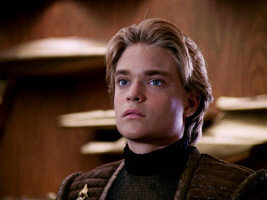
 "Suddenly Human"
"Suddenly Human"